AMD Radeon RX 6800 XT Roundup: ASRock, Asus, and Sapphire Reviewed
Factory overclocked RX 6800 XT cards that you still can't find in stock
The next-gen consoles are supposed to tackle 4K gaming, but there's 4K gaming and then there's 4K gaming. 4K via upscaling and ray tracing effects targeting 30 fps is most likely what we'll see from the PS5 and XSX. 4K native at 60 fps, even without ray tracing, is going to be more difficult, even on high-end PC hardware.
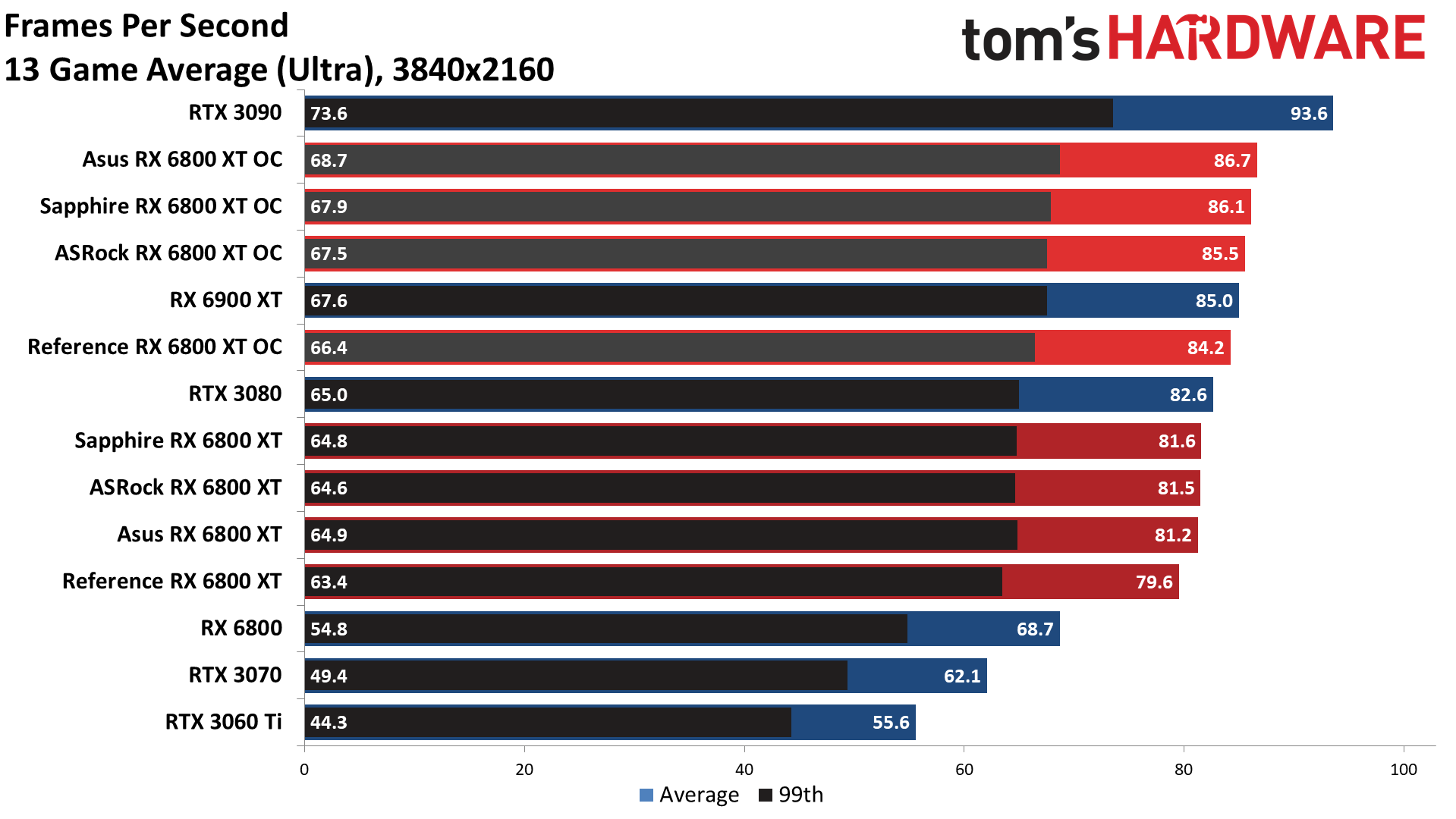
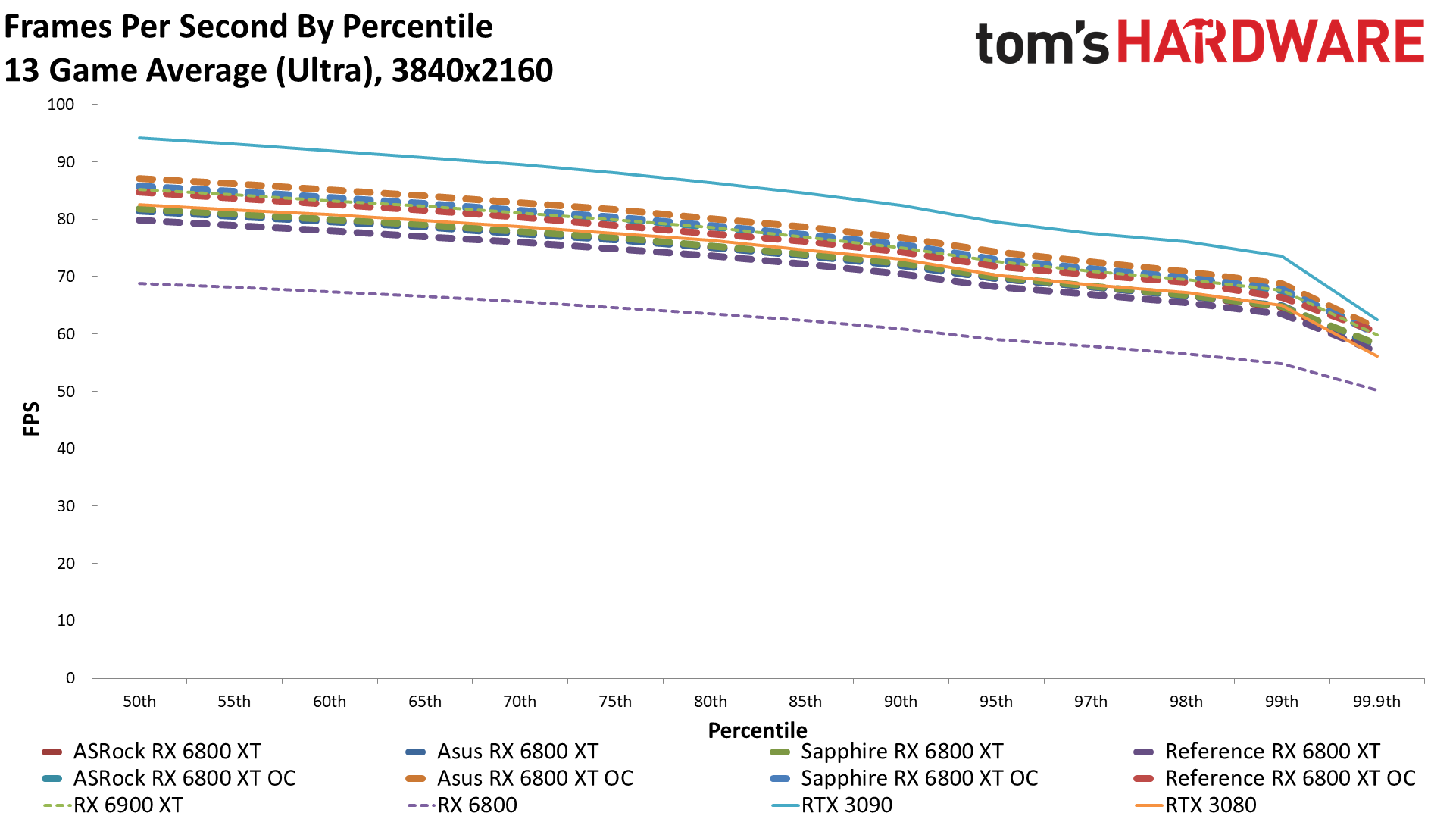
The good news is that many games easily reach 60+ fps at 4K on the RX 6800 XT cards, along with other extreme performance GPUs. The custom AIB models all end up around 2 percent faster than the reference 6800 XT at stock, which isn't actually that great considering they also use about 10 percent more power. Overclocking pushes the cards into 370W and higher territory, again for relatively minor performance improvements.
It's important to remember the mix of games and settings used when looking at this overall chart as well. If we toss out the newer games that strongly favor one GPU brand, like Assassin's Creed Valhalla, Dirt 5, and Watch Dogs Legion, the relative performance can shift around quite a bit. But we figure we at least capture a relatively large cross-section of the overall market with 13 games. The 3080 ends up just slightly ahead of the 6800 XT cards at stock, mostly thanks to its significant advantage in WDL. Do you need DXR to make a game fun? Absolutely not. However, it's also disingenuous to suggest that DXR doesn't matter at all; it's just going to take longer to get to the point where DXR and RT become the norm rather than an option for extreme hardware.
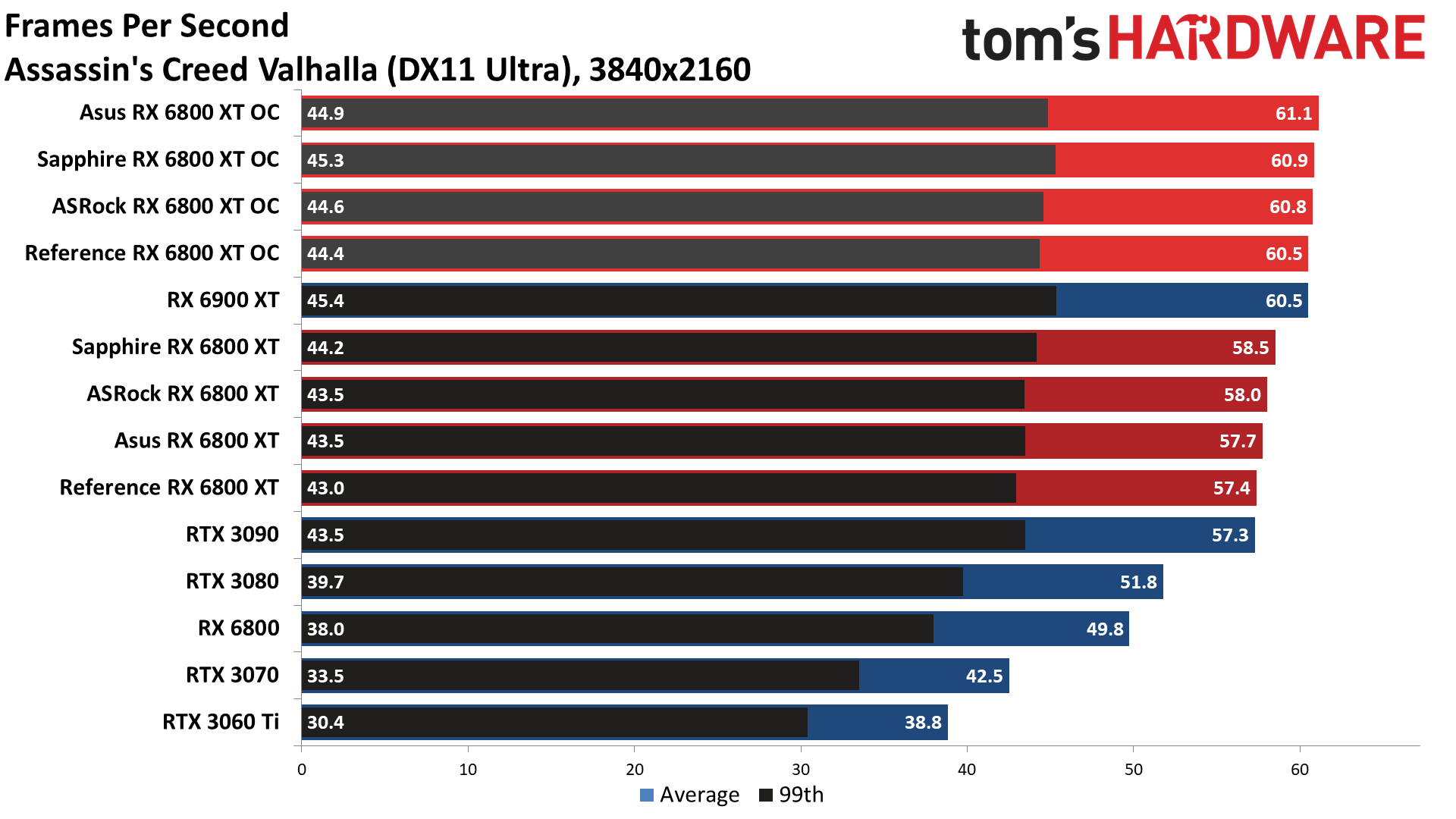
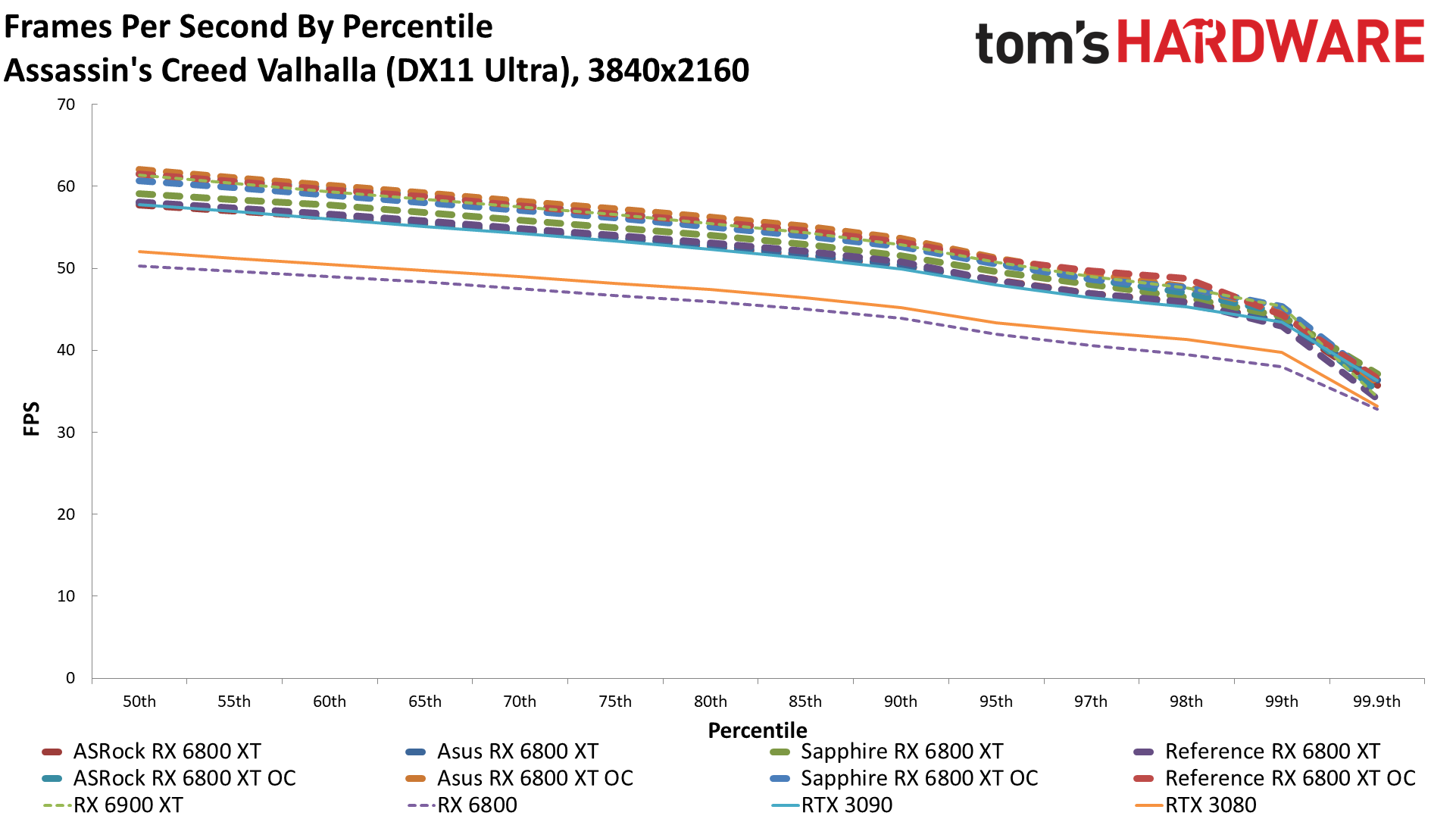
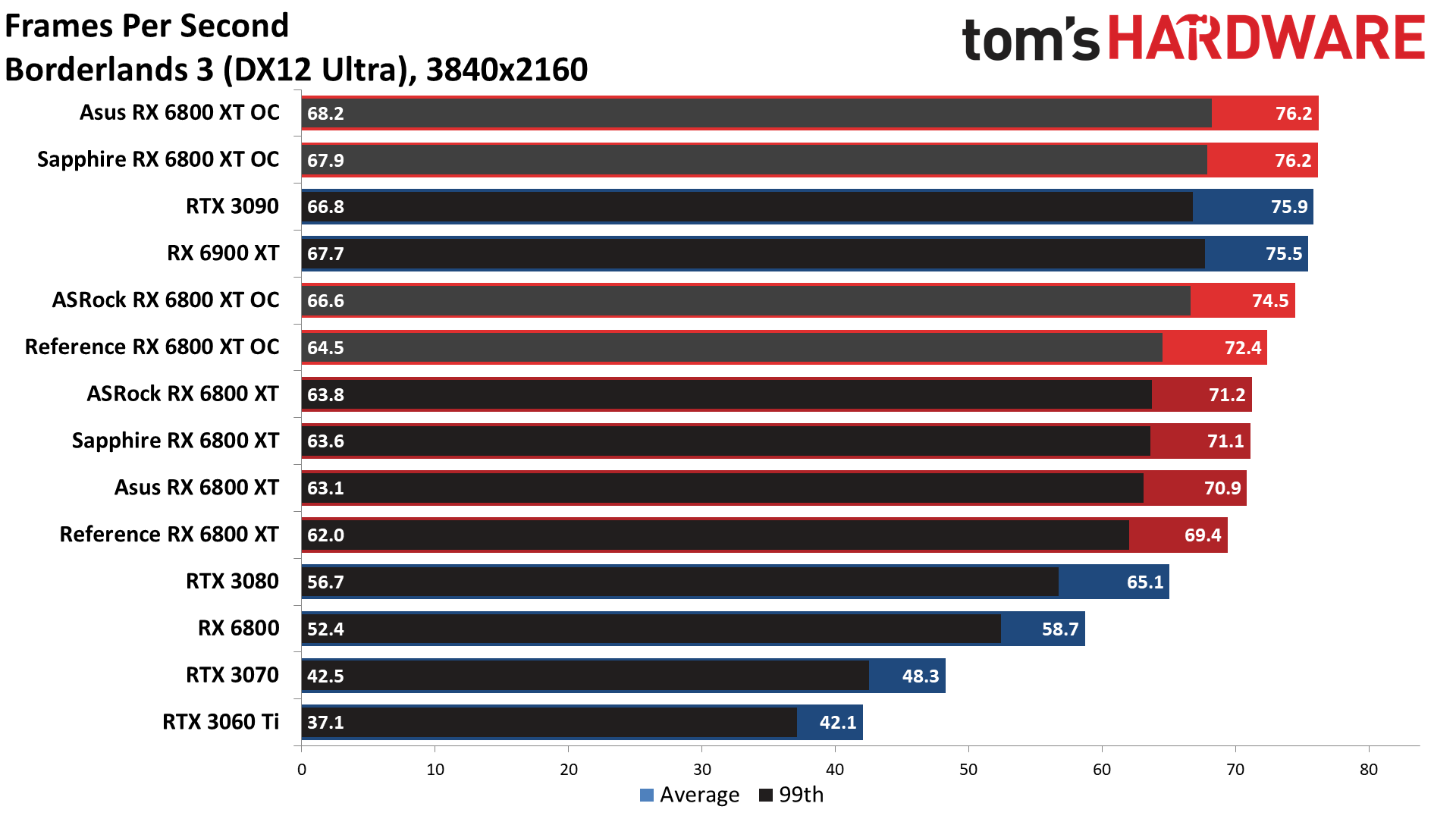
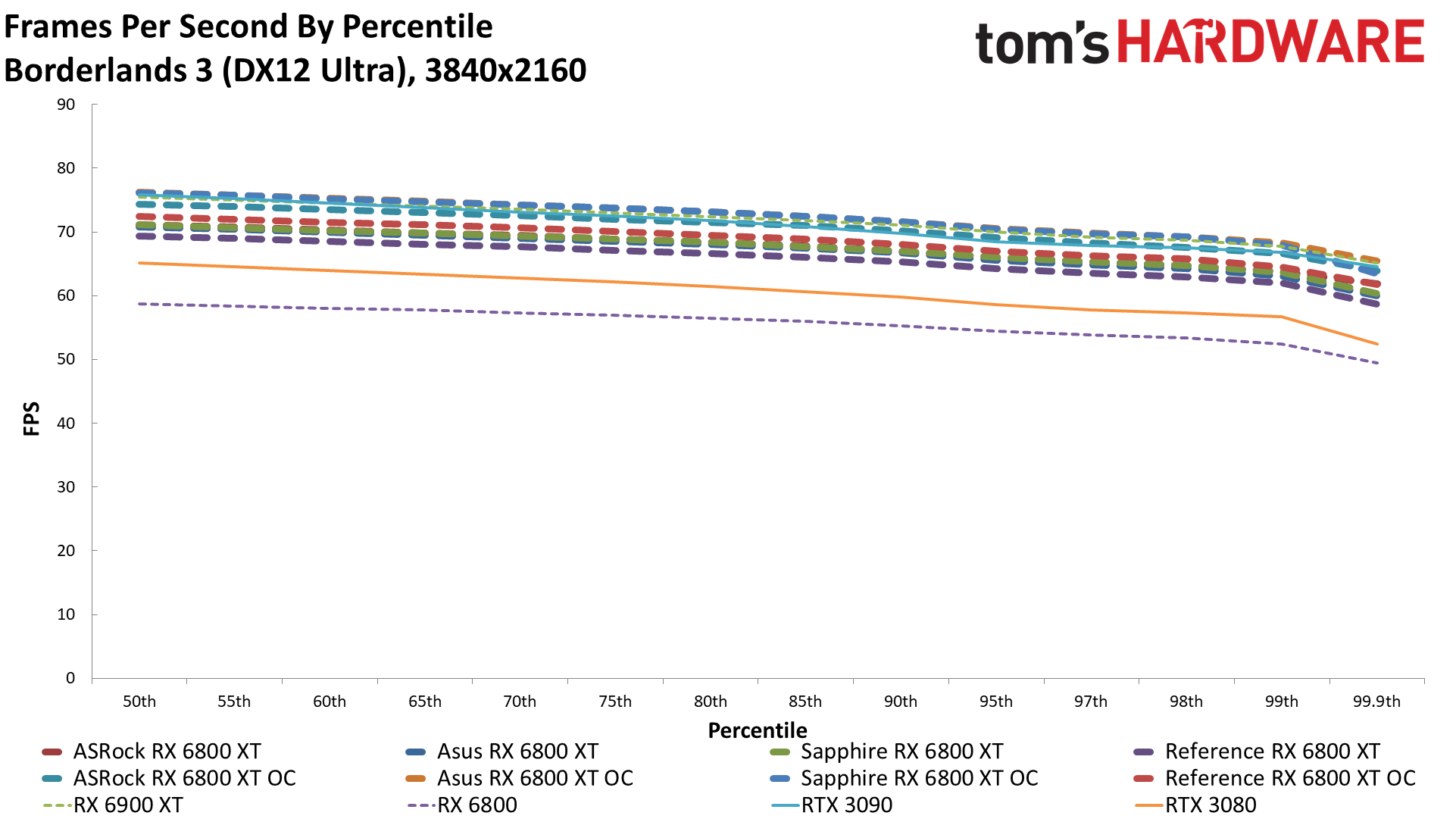
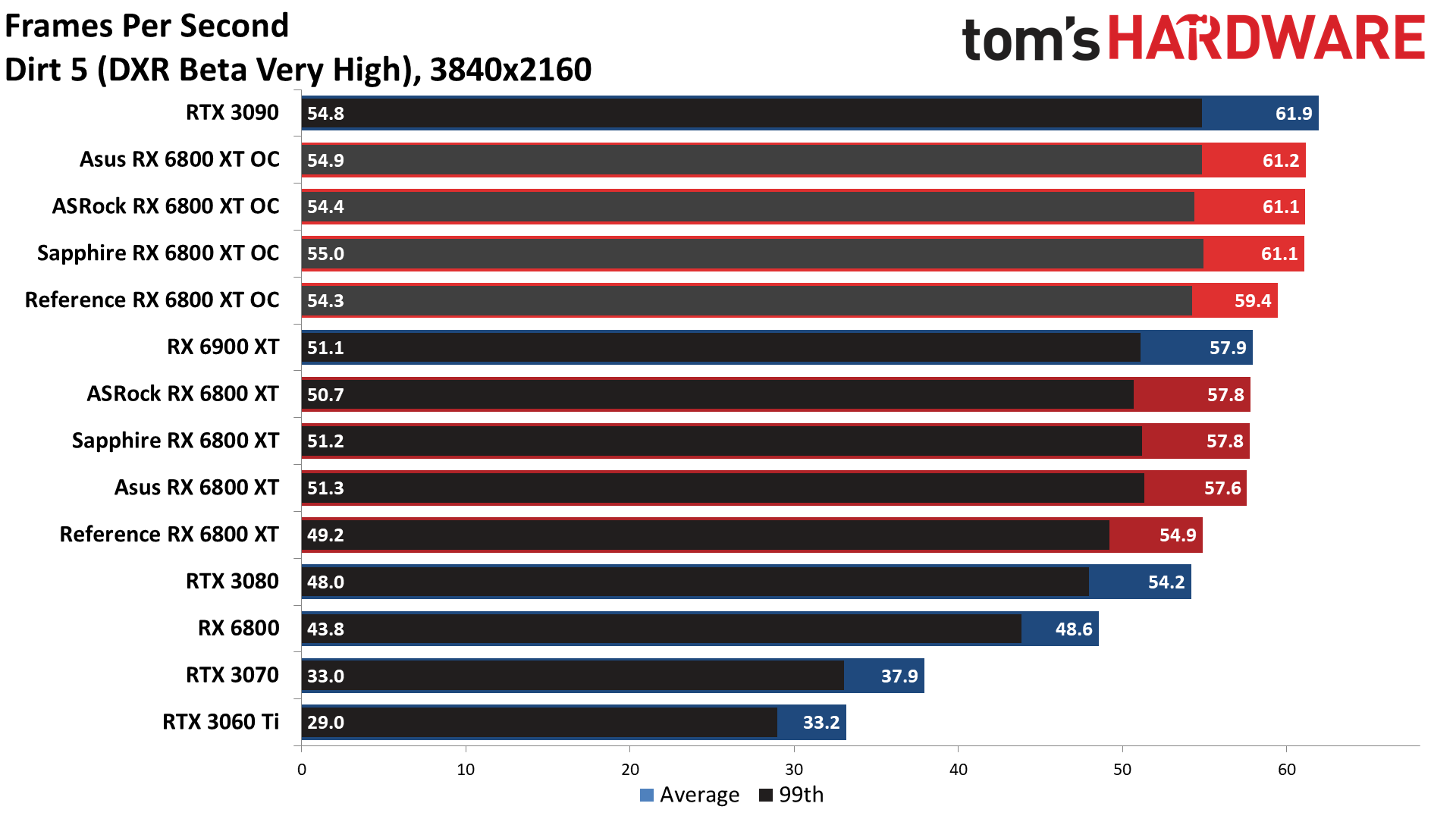
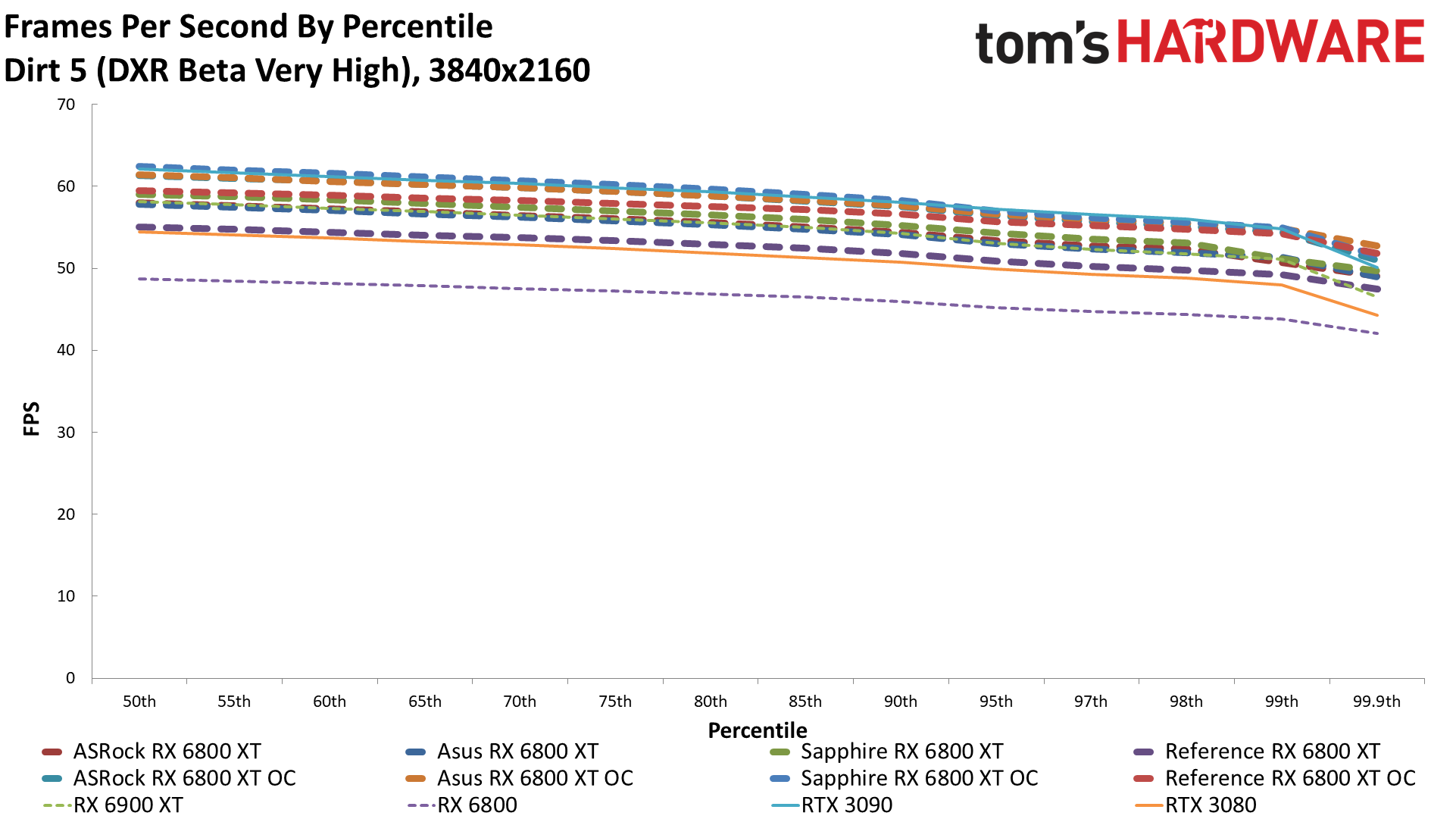
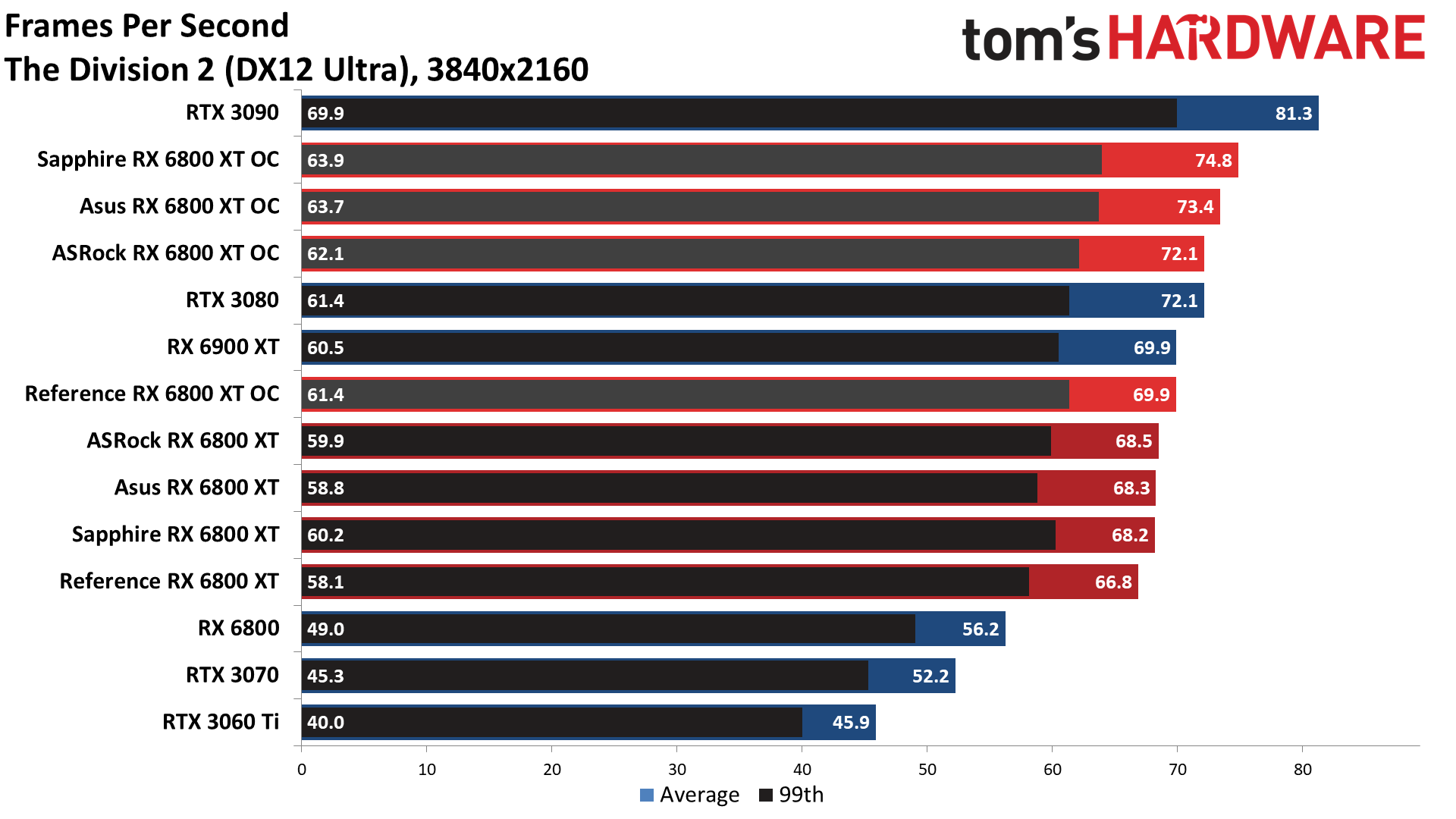
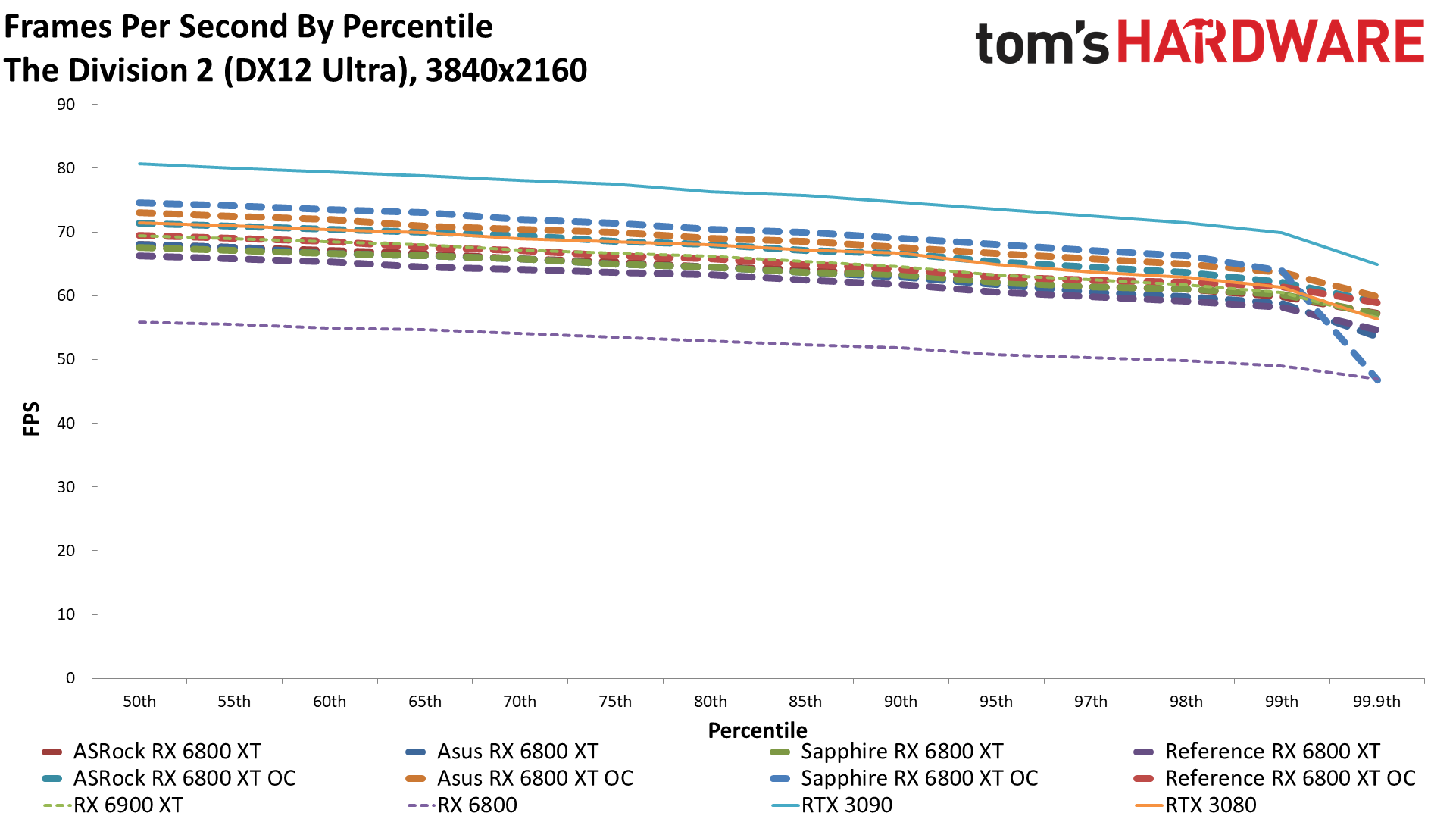
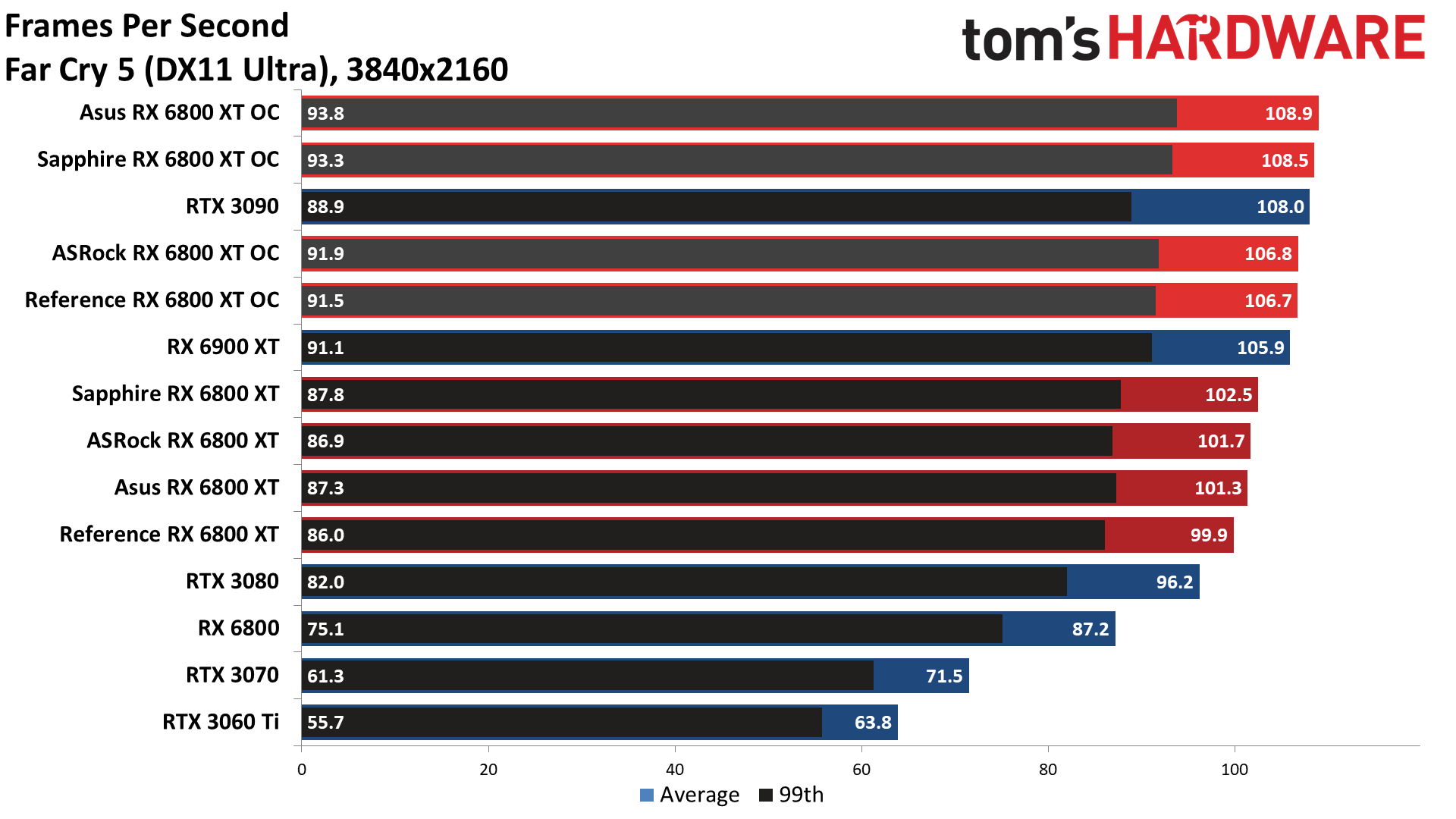
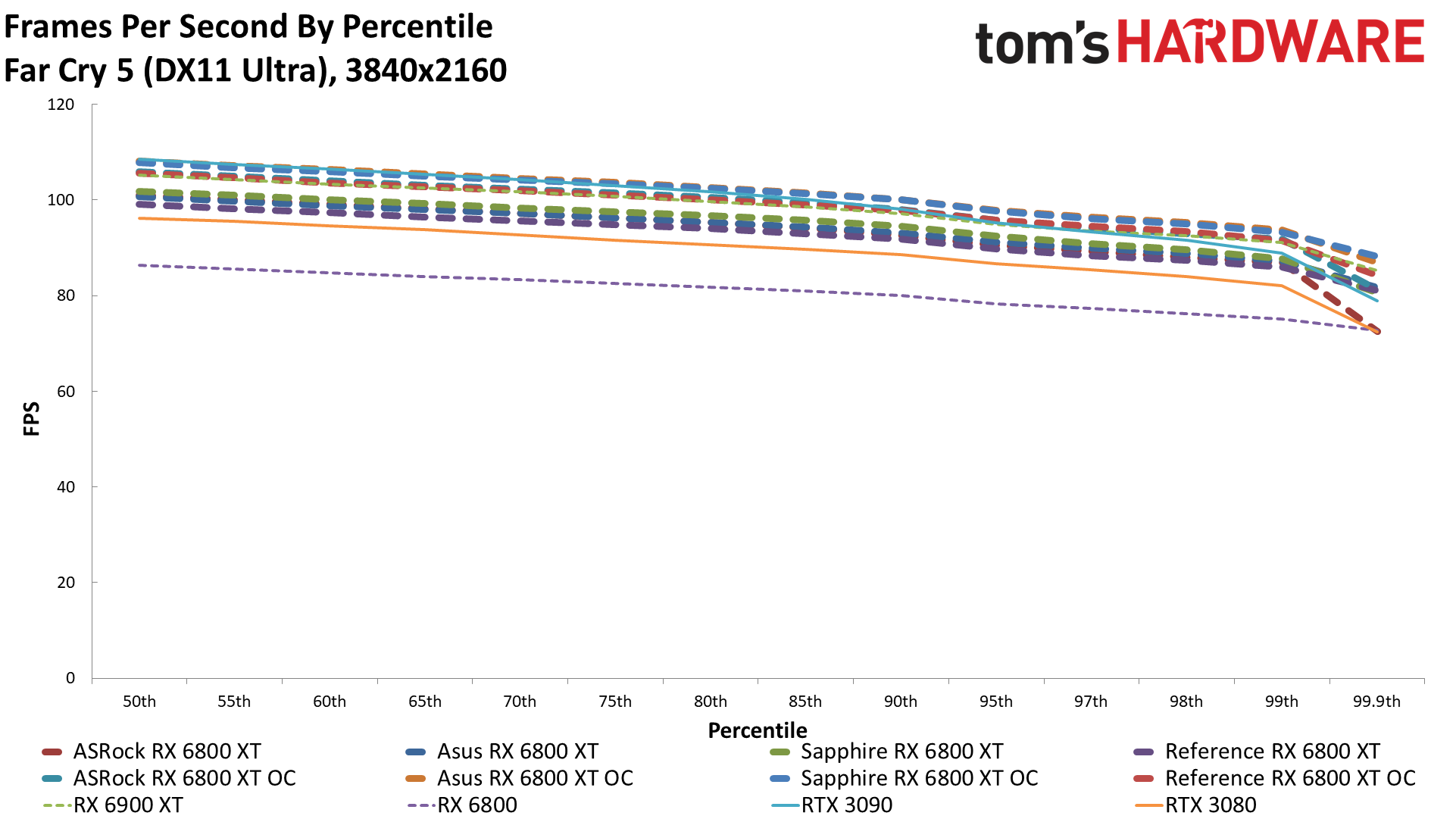
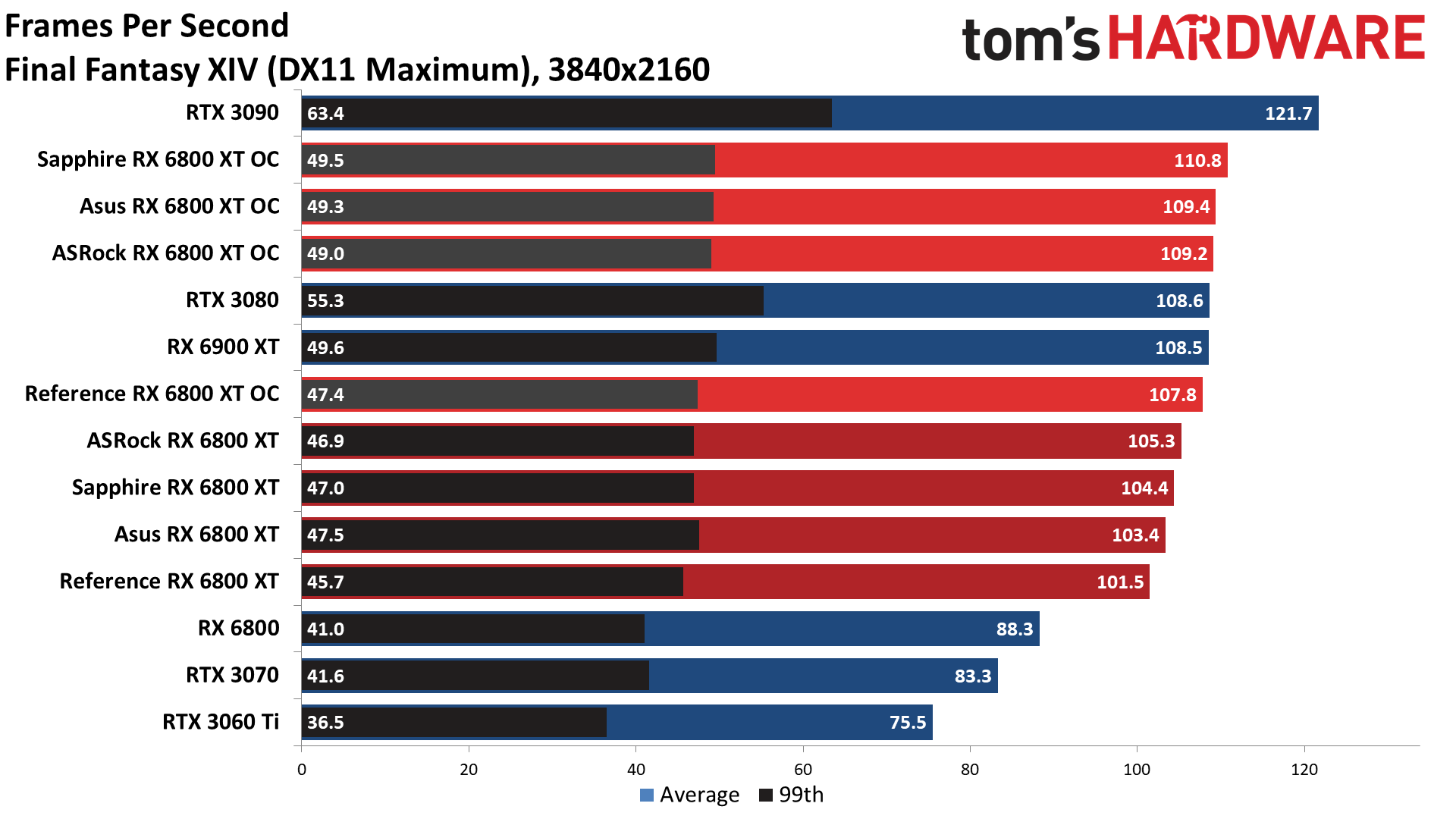
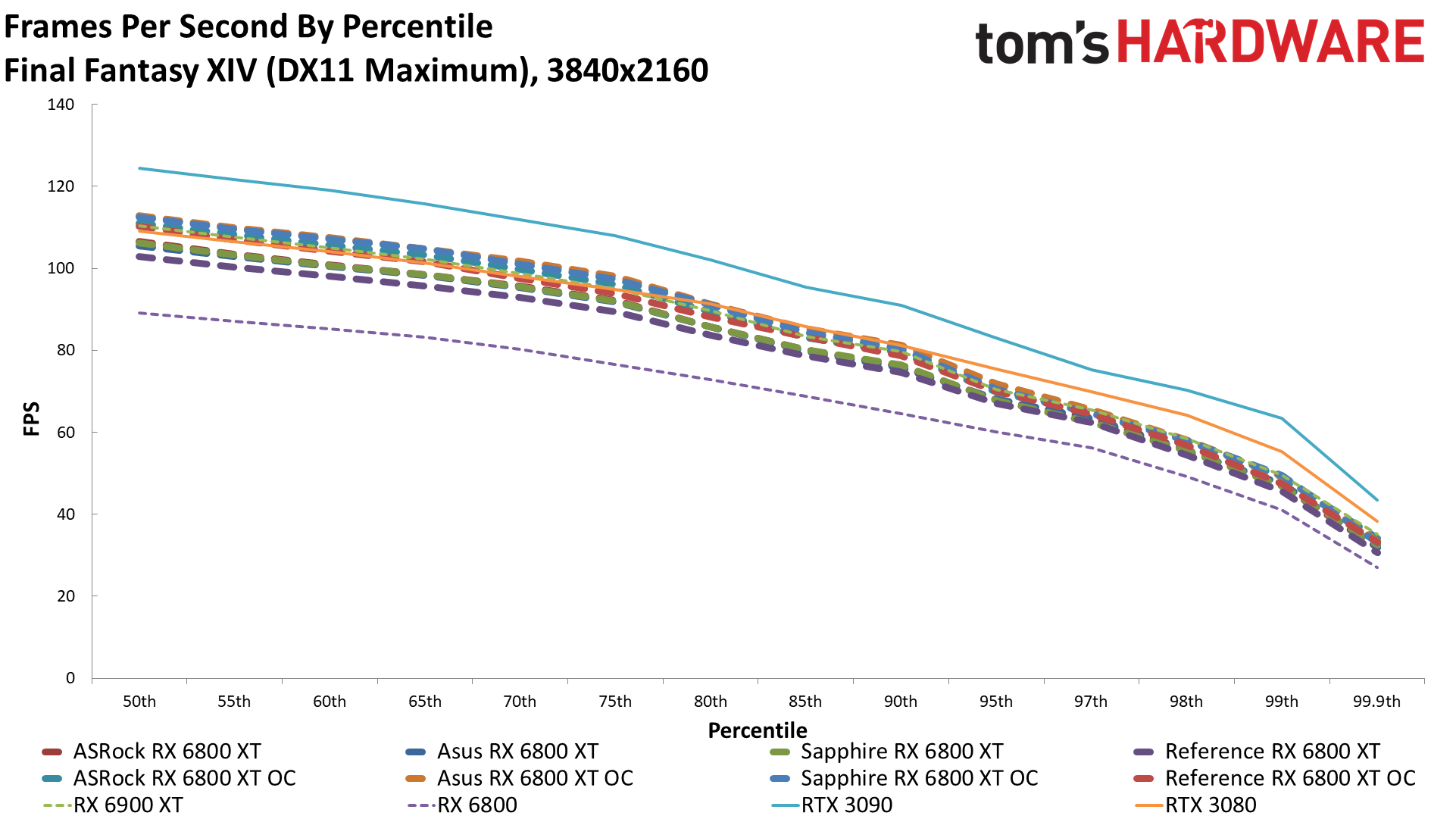
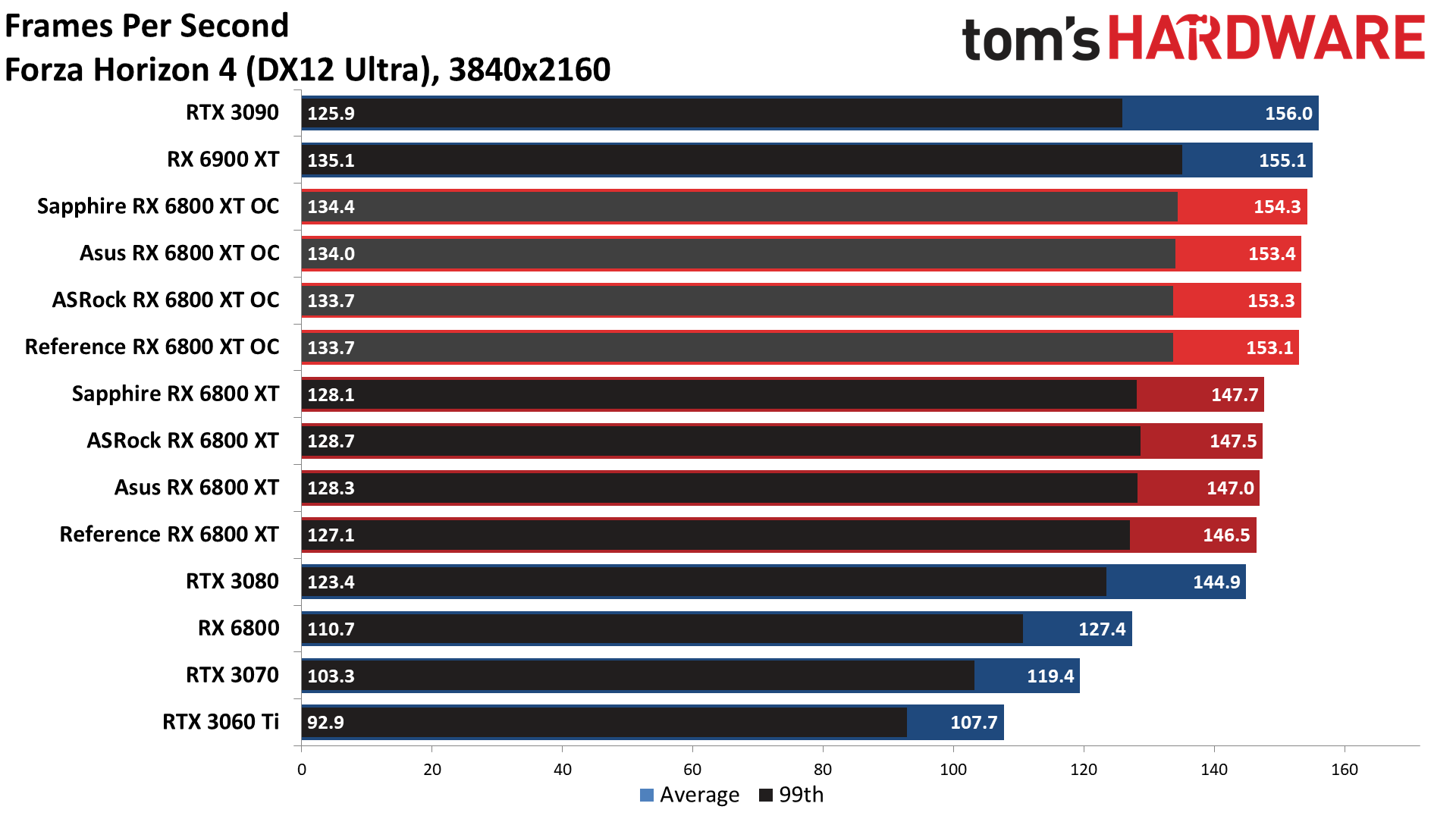
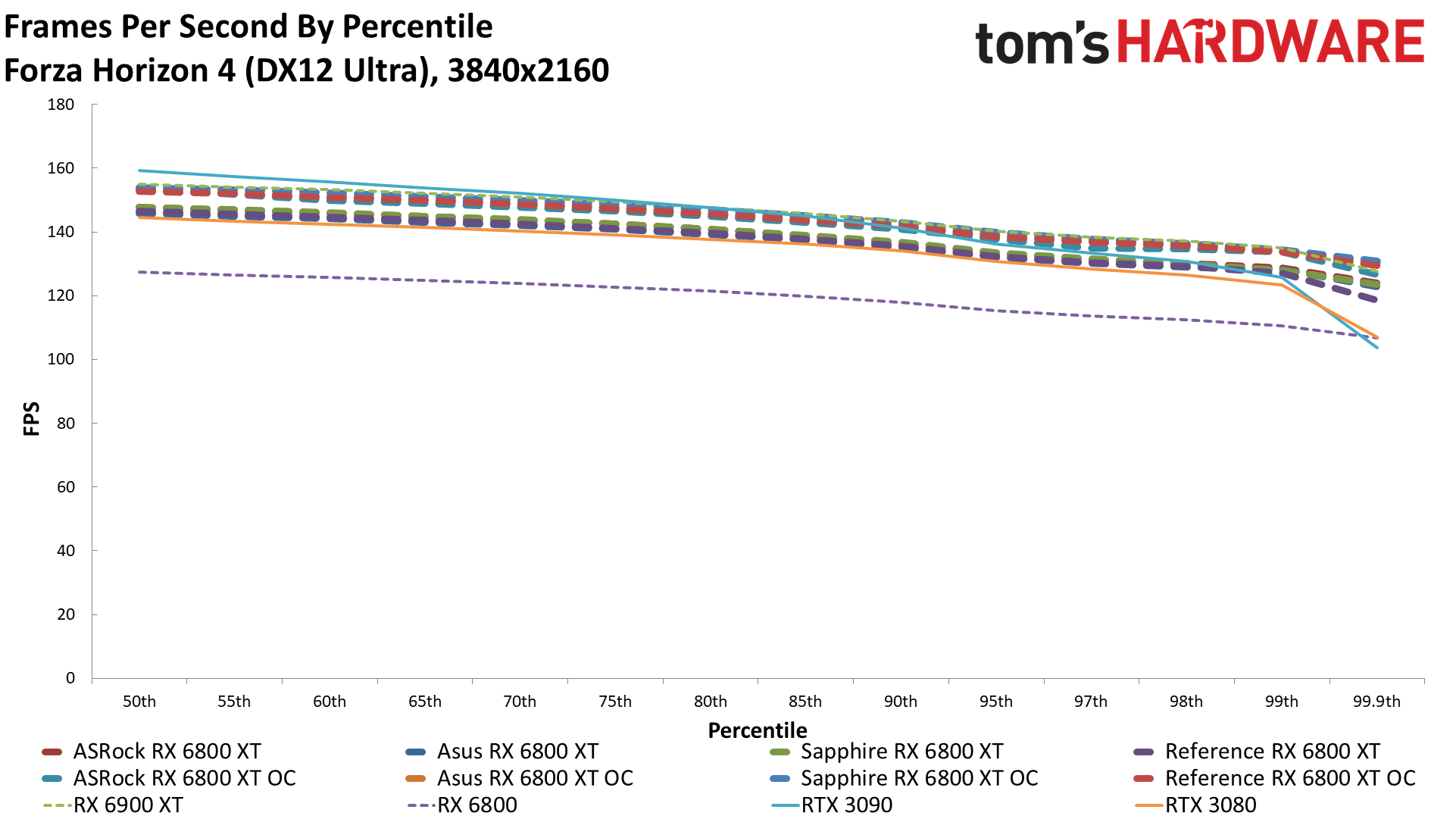
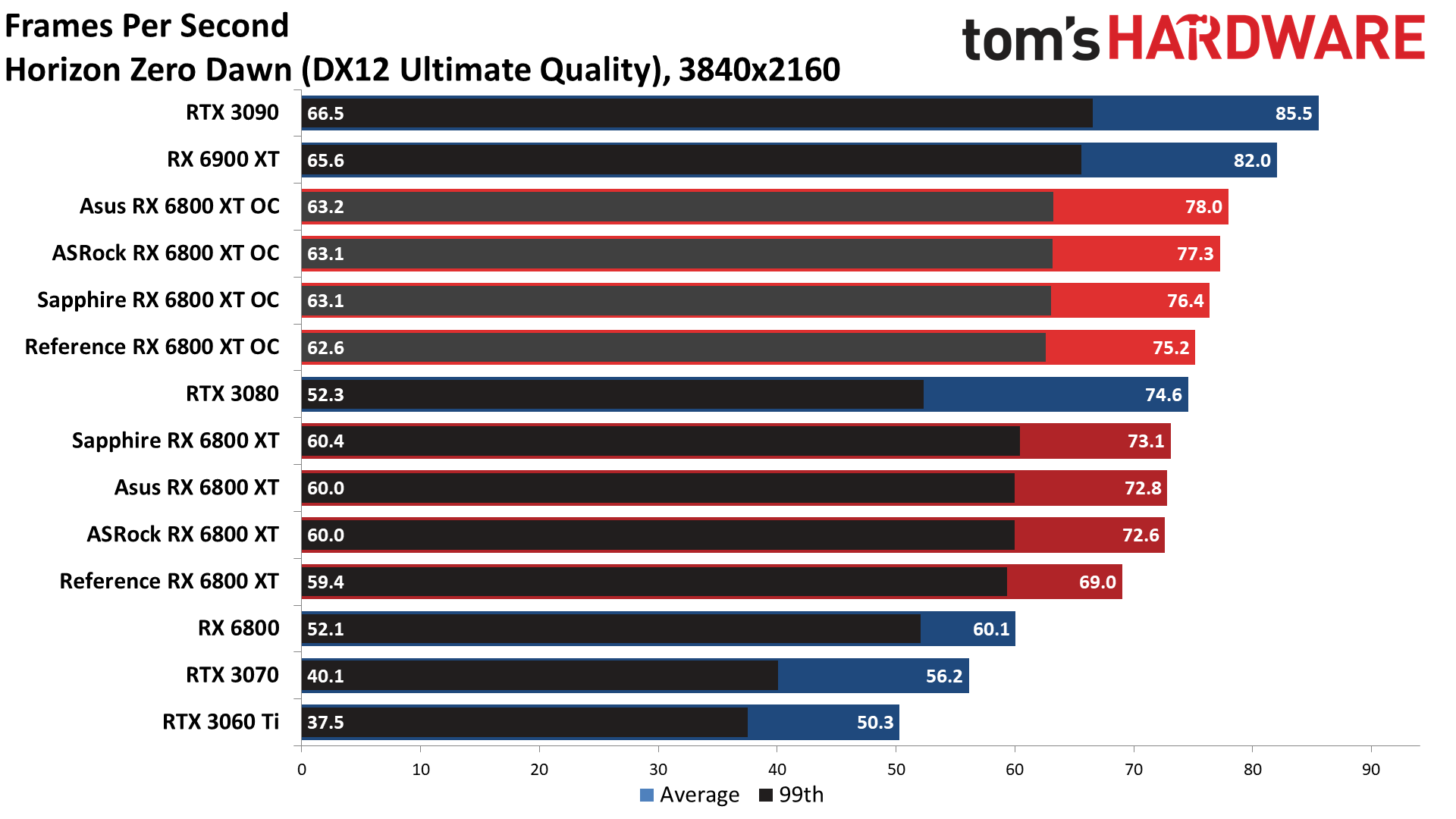
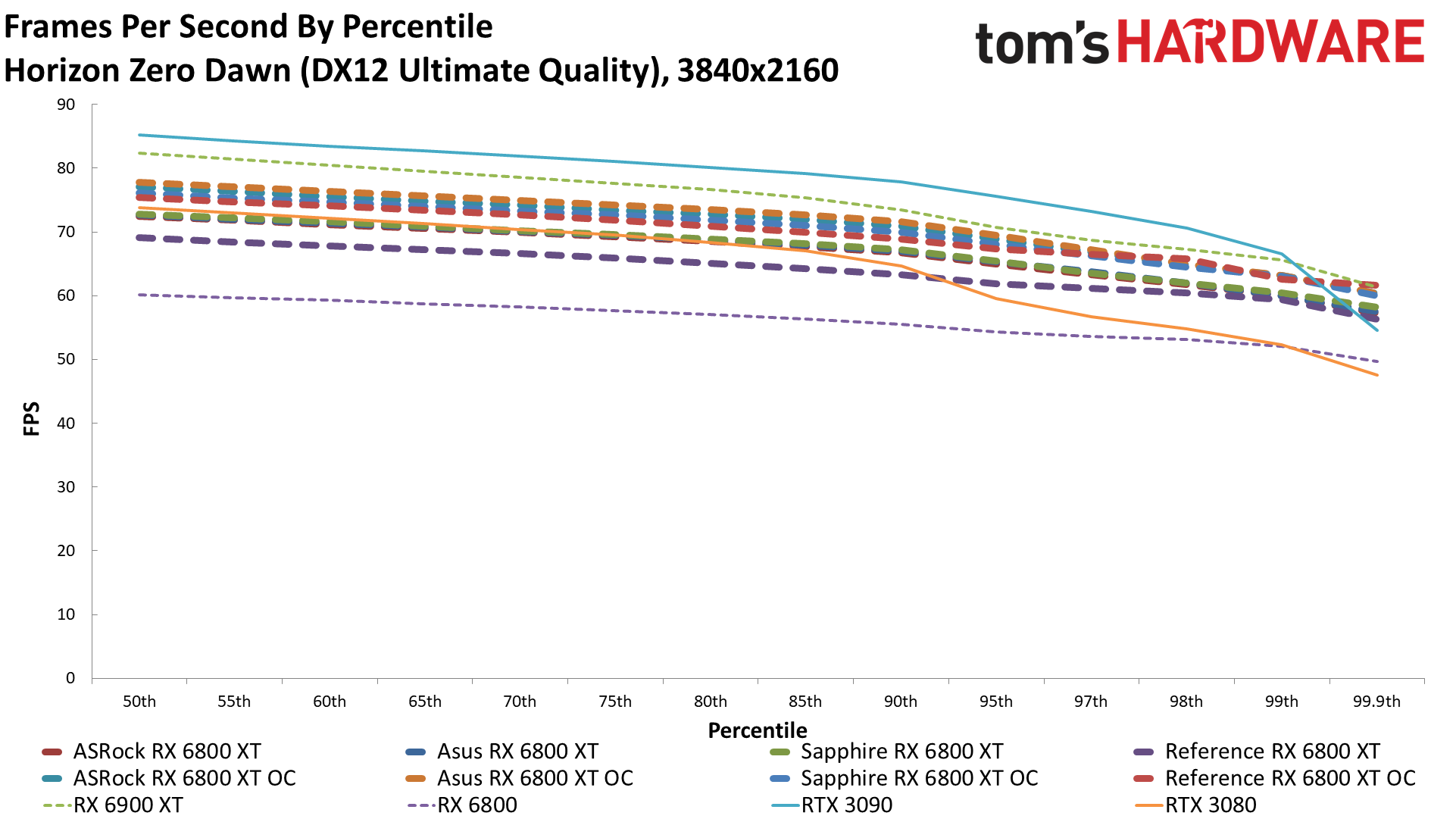
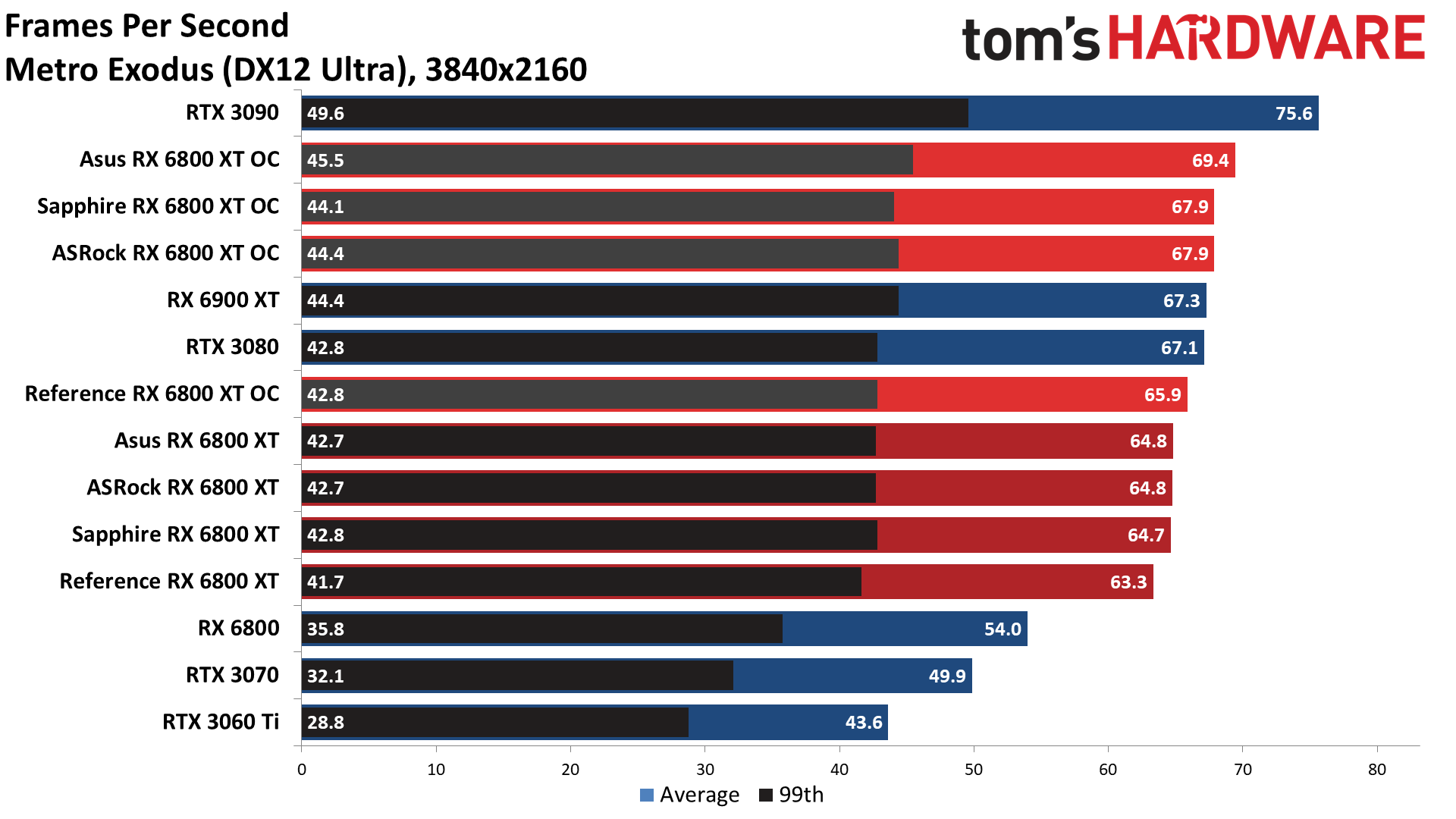
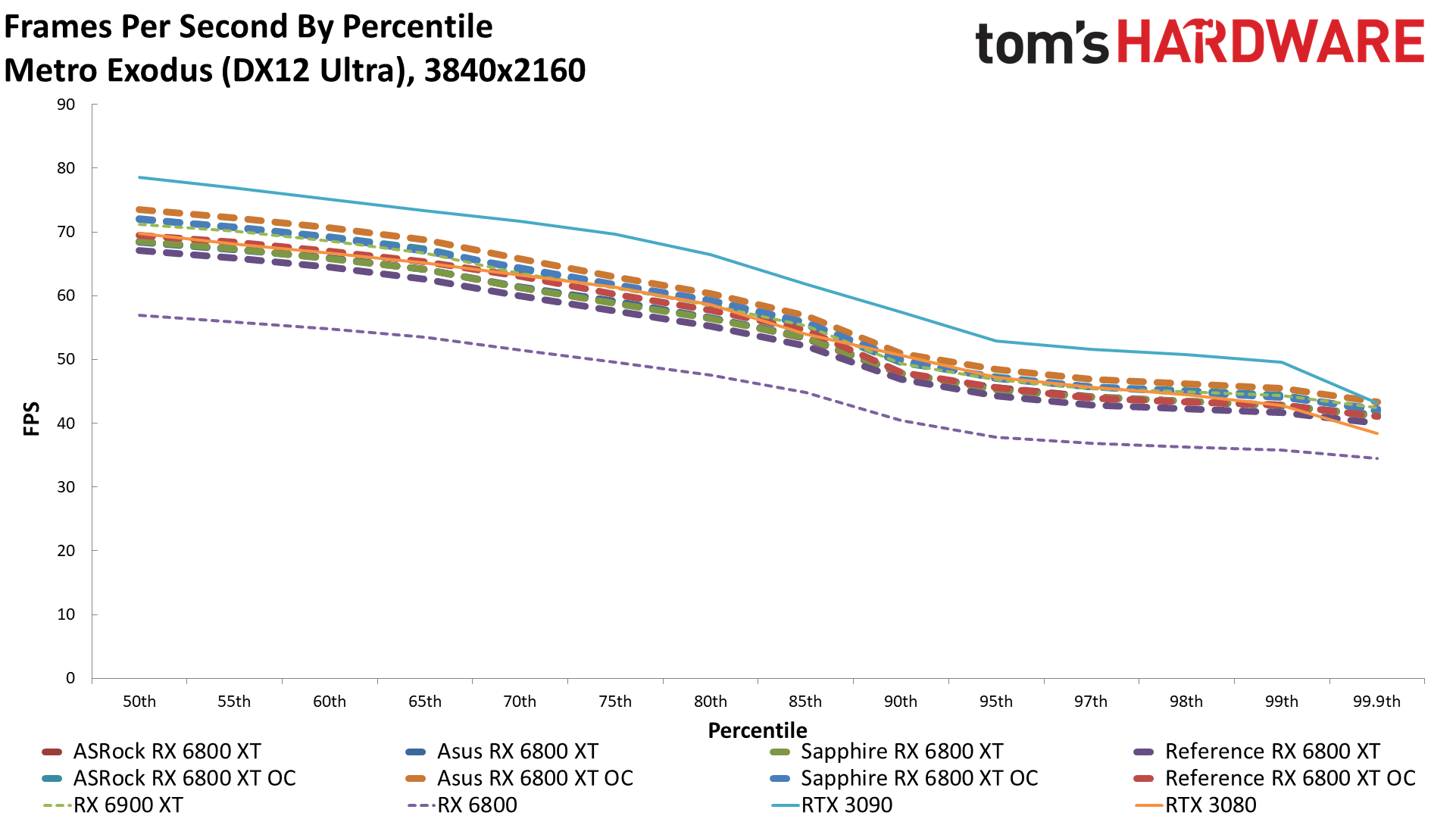
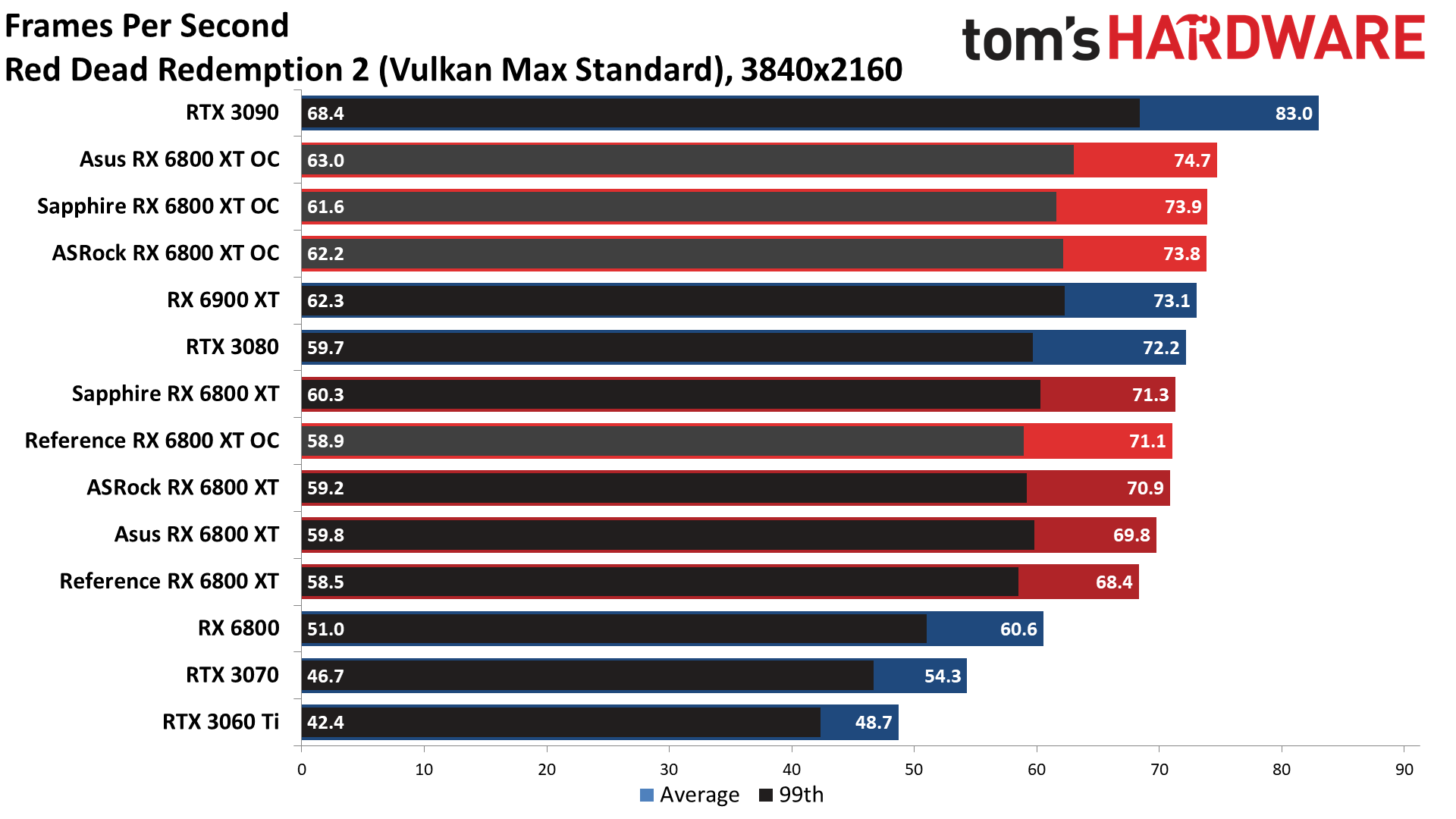
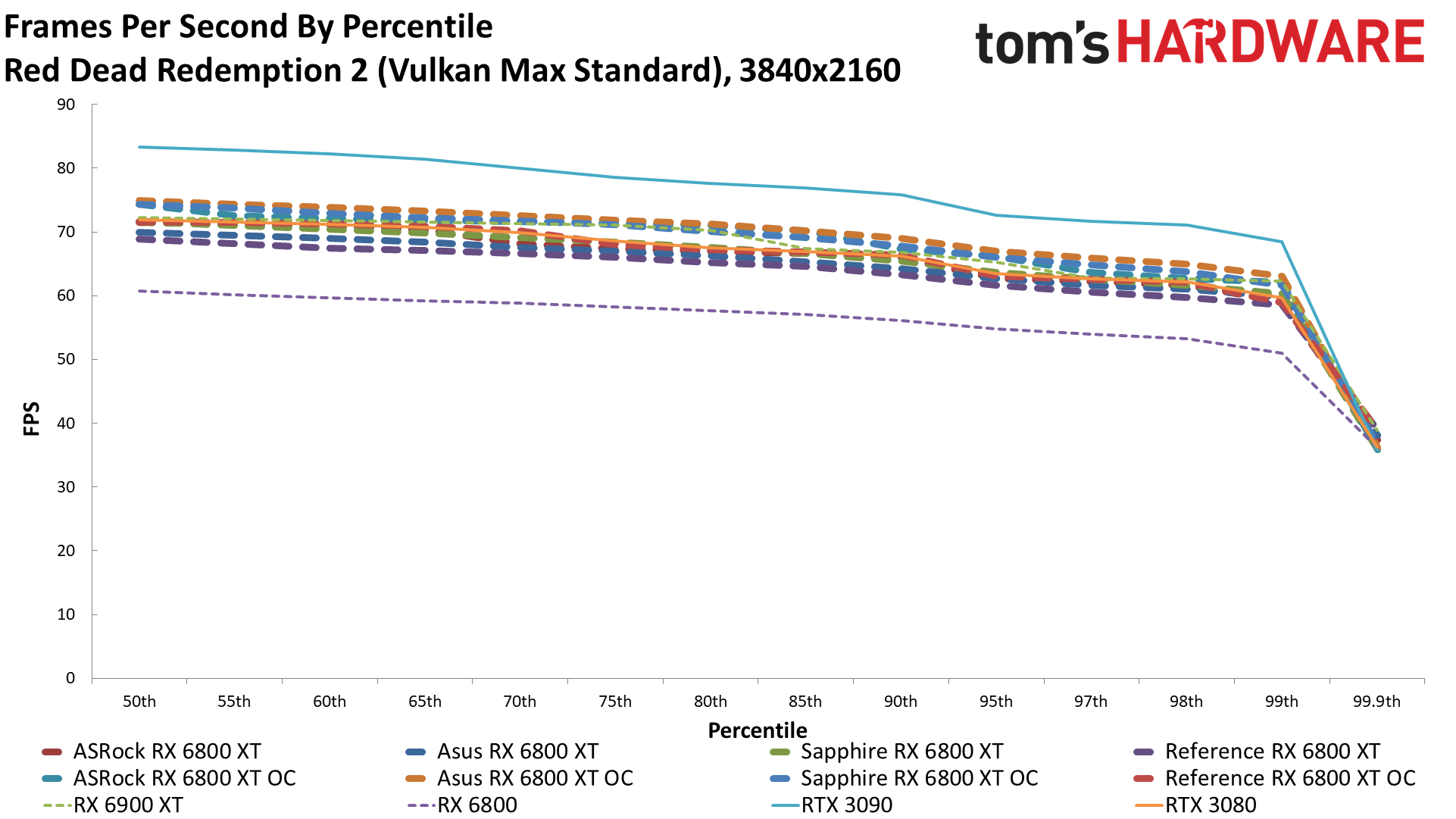
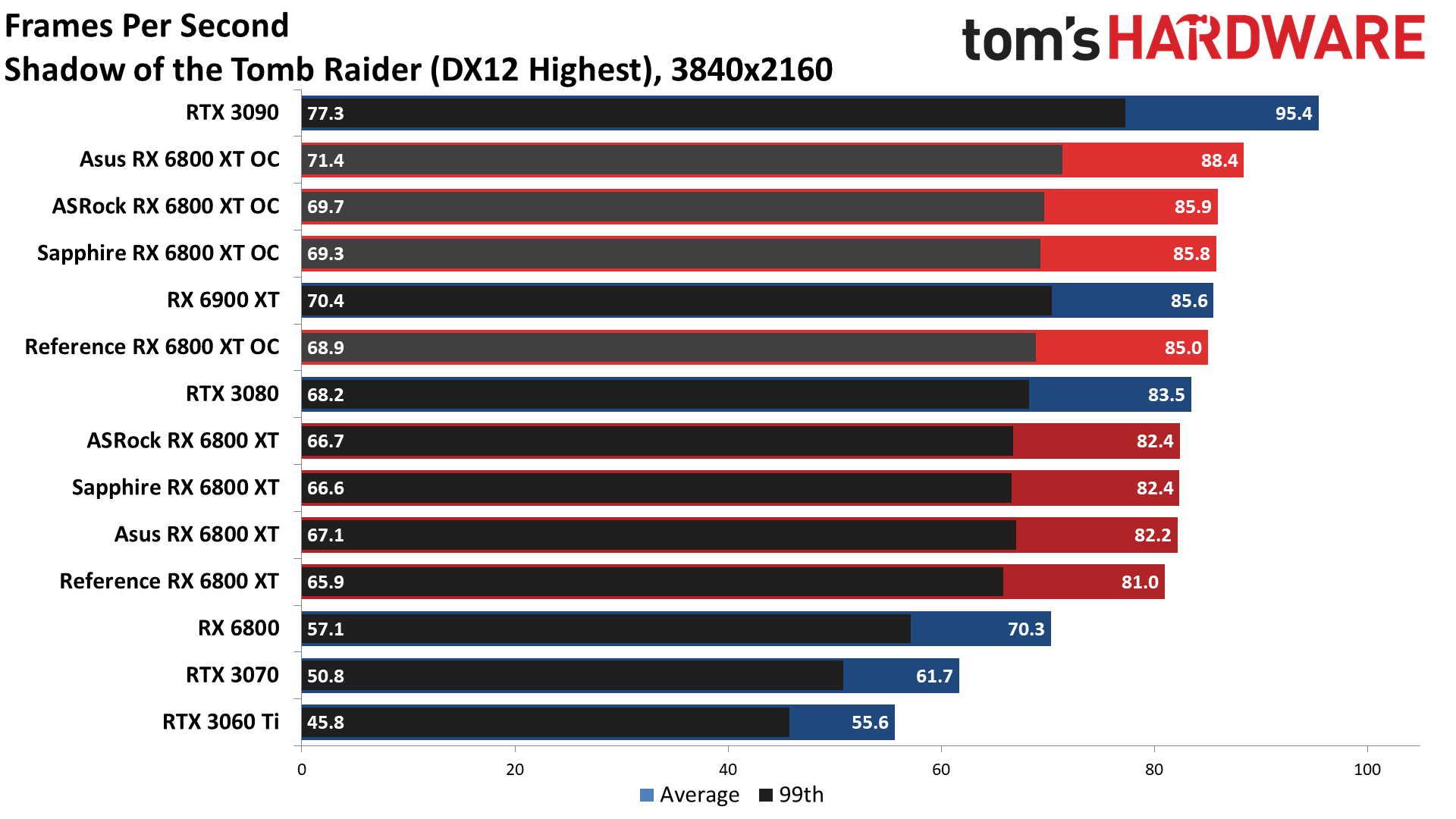
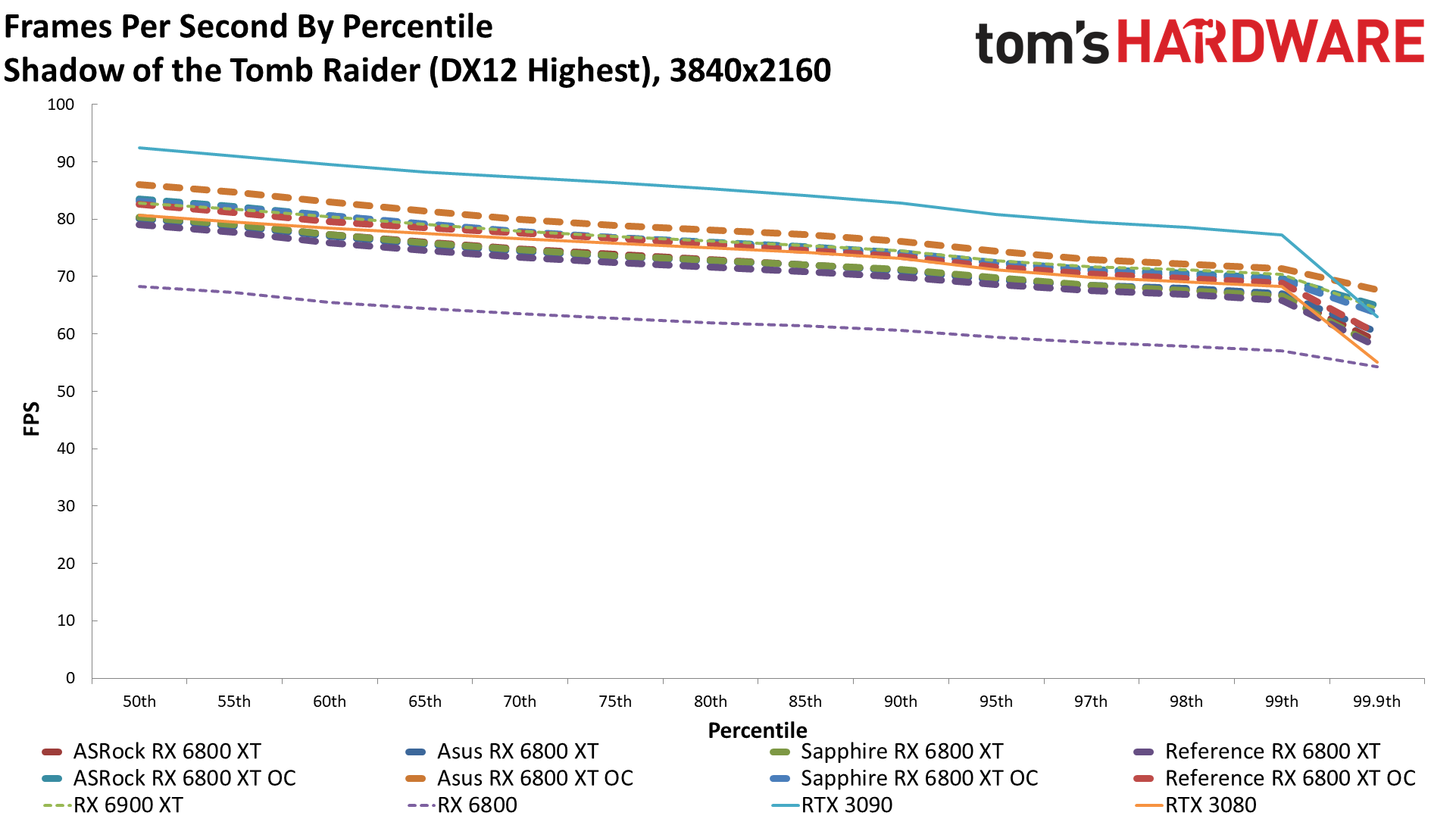
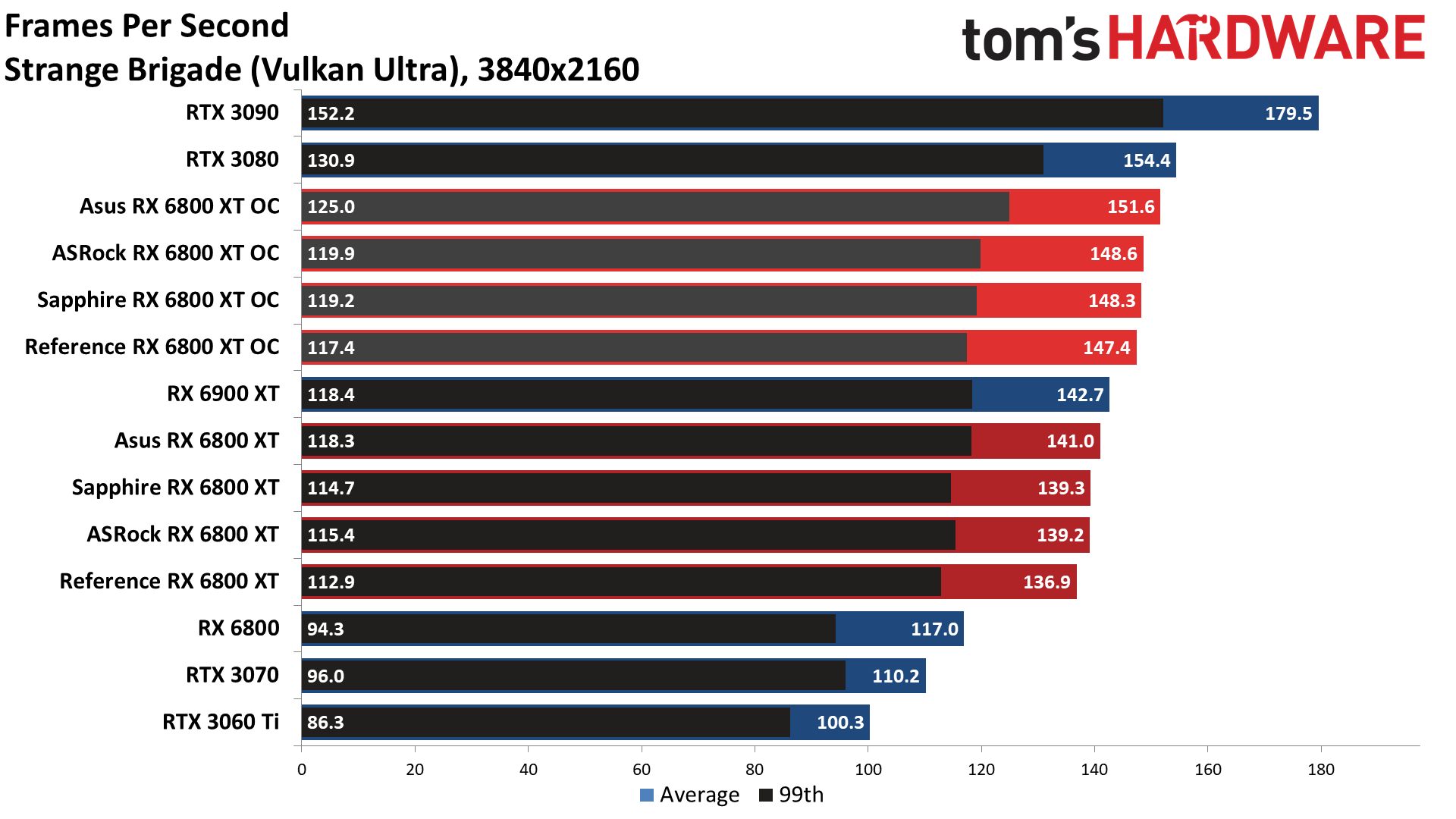
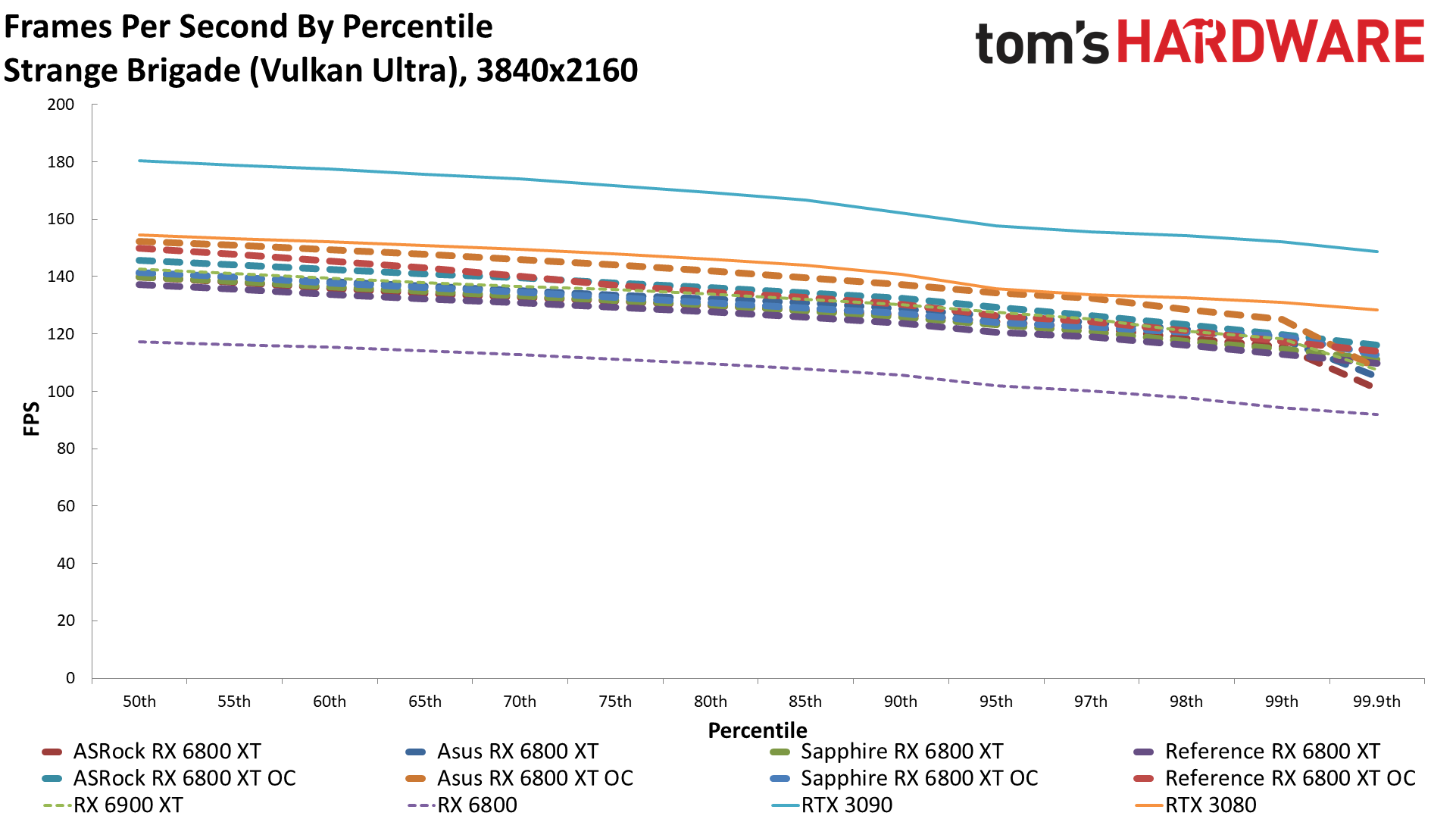
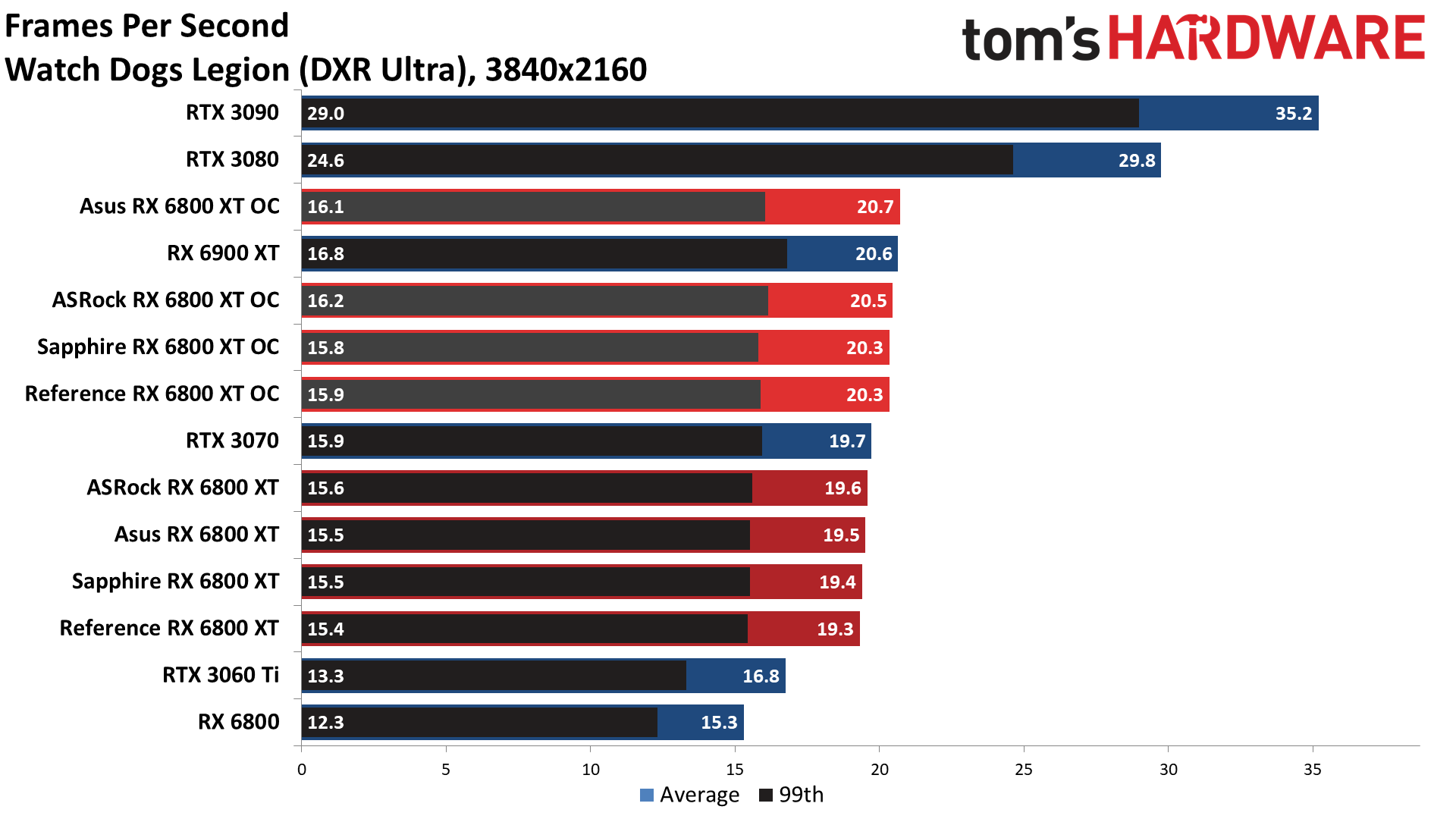
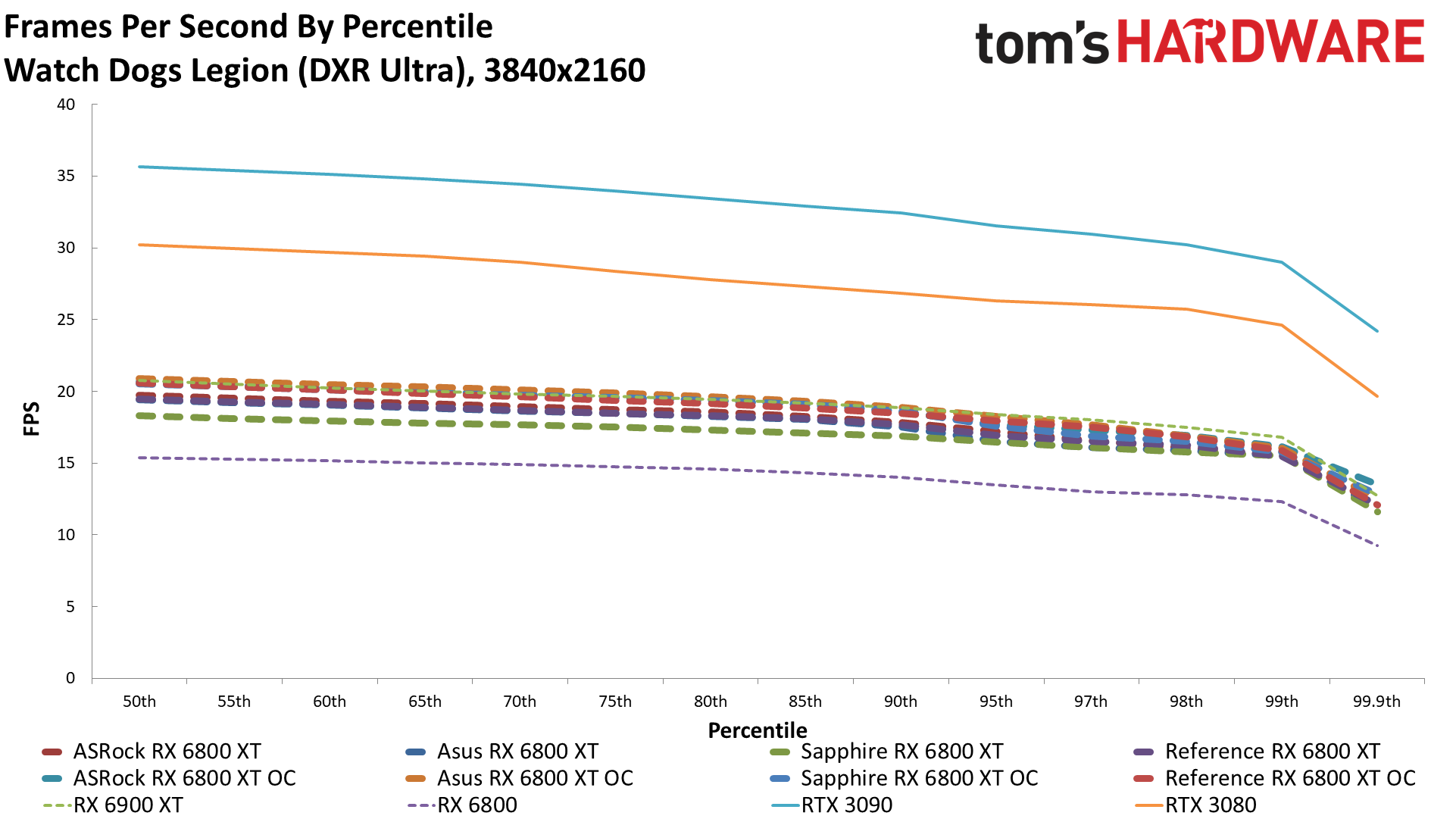
Individual gaming charts at 4K mostly echo what we've seen already, just with lower frame rates. Every game outside of Watch Dogs Legion easily surpassed 60 fps at 1440p ultra, but there are a few more exceptions at 4K. Assassin's Creed Valhalla and Dirt 5 join WDL in the sub-60 group, though they're both relatively close to 60 fps on the 6800 XT. On the other hand, Watch Dogs isn't even close — it falls below 20 fps on the custom 6800 XT cards we're focusing on. Radeon gamers will definitely need to disable DXR reflections or run at a lower resolution if they want to play that game at acceptable frame rates.
MORE: Best Graphics Cards
MORE: Desktop GPU Performance Hierarchy Table
MORE: All Graphics Content
Get Tom's Hardware's best news and in-depth reviews, straight to your inbox.
Current page: Radeon RX 6800 XT Roundup: 4K Gaming Benchmarks
Prev Page Radeon RX 6800 XT Roundup: 1440p Gaming Benchmarks Next Page Radeon RX 6800 XT Roundup: Power, Thermals, Clocks, Fans, and Noise
Jarred Walton is a senior editor at Tom's Hardware focusing on everything GPU. He has been working as a tech journalist since 2004, writing for AnandTech, Maximum PC, and PC Gamer. From the first S3 Virge '3D decelerators' to today's GPUs, Jarred keeps up with all the latest graphics trends and is the one to ask about game performance.
-
Makaveli Canadian pricing for these cards. Asrock from newegg.ca and the last two from canada computers.Reply
ASRock Radeon RX 6800 XT Taichi Gaming $1499
SAPPHIRE NITRO+ Radeon RX 6800 XT $1149
ASUS ROG STRIX LC Radeon RX 6800 XT $1299
And for the money Asus is asking for this card, they could have alteast sleeved those fan cables its mess. For $1000+ asking price kinda of a slap in the face. -
Jobeker Your testing methodology is flawed.Reply
The memory should not be overclocked in these cards.
These cards show much better results once you push the GPU to the max & leave the memory at stock.
It seems that you & all the other testers I have come to respect in almost 2 decades of reading tests & benchmarks , have become fixated on maxing the mem to the point of "no crush" without even comparing the results.
I hope you still have at least one of the cards at hand to make 1 more test, you will see that stock mem@2000mhz + GPU@2600mhz gets much better results than mem@2140mhz + GPU@2600mhz .
I am active on a different language forum & a local system builder/fine tuner corroborated these results with several different 6800XT cards.
( he is the one that Identified this issue , I don't own such a card at the moment)
He is now testing a 6900XT .
As a bonus , once you leave the memory at stock you get a few extra watts for higher gpu oc.
I don't care that much about the actual value of the specific cards ( definitely not at current pricing ) it is however very important for me to make sure you testing methodology isn't flawed.
I seriously hope you still have one of the cards for one more test . -
JarredWaltonGPU Reply
Define "much better results" for me, please. The overclocking is not supposed to be the major focus, because silicon lottery and other elements come into play. Frankly, I wouldn't bother overclocking most GPUs -- it's just not enough of a gain to warrant the added power and potential stress on the hardware. Anyway, a 7.5% memory OC isn't much, and neither is the 3-7% increase in performance I measured with the 'max' OC I achieved.Jobeker said:Your testing methodology is flawed.
The memory should not be overclocked in these cards.
These cards show much better results once you push the GPU to the max & leave the memory at stock.
It seems that you & all the other testers I have come to respect in almost 2 decades of reading tests & benchmarks , have become fixated on maxing the mem to the point of "no crush" without even comparing the results.
I hope you still have at least one of the cards at hand to make 1 more test, you will see that stock mem@2000mhz + GPU@2600mhz gets much better results than mem@2140mhz + GPU@2600mhz .
I am active on a different language forum & a local system builder/fine tuner corroborated these results with several different 6800XT cards.
( he is the one that Identified this issue , I don't own such a card at the moment)
He is now testing a 6900XT .
As a bonus , once you leave the memory at stock you get a few extra watts for higher gpu oc.
I don't care that much about the actual value of the specific cards ( definitely not at current pricing ) it is however very important for me to make sure you testing methodology isn't flawed.
I seriously hope you still have one of the cards for one more test .
Dropping the memory OC and trying for a slightly higher core OC is totally within the parameters of what can be done, and may improve performance more than what I've shown. More effort on tuning voltages, fan speeds, etc. could also improve performance. Without physically modding the cards, though, I strongly doubt you'll see more than a 5% improvement over what I achieved, which is a 10% potential total improvement. In practice, I'm sure it would be far less than that -- probably only a 1-2% difference from my max core + max RAM OC results. And there's a very good chance that, despite what you're positing, overclocking the memory actually does improve performance.
Let me give you just one example, because based on this I see no reason to bother retesting anything more.
SettingAsus Strix LC RX 6800 XT OCAsus Strix LC RX 6800 XT OC StockRAMAsus Strix LC RX 6800 XTMetro Exodus1080p Ultra125.09123.2119.46
1440p Ultra105.43103.6999.77
4k Ultra69.4468.5264.81
So, in at least one game, using the same card in all three cases (the Asus Strix LC), dropping the RAM OC but leaving the GPU at the same 2600 MHz setting reduced performance by 1-2%. So much for my "flawed" methodology. -
shady_021 The only thing I see here is all 6800 XT are equal or slightly ahead of a 6900 XT... so except for the price difference what's the point of having a 6900XT?Reply -
JarredWaltonGPU Reply
The overclocked RX 6800 XT cards match the stock RX 6900 XT. If I overclocked the 6900 XT as well, it comes out a bit ahead again.shady_021 said:The only thing I see here is all 6800 XT are equal or slightly ahead of a 6900 XT... so except for the price difference what's the point of having a 6900XT?
This is something I pointed out in the RX 6900 XT review: it has identical clocks, TDP, and VRAM, so the only difference is 80 CUs instead of 72 CUs. That means at most an 11% advantage for the 6900 XT, but because of VRAM being the same it is usually more like 4-5%. So it's not really worth the extra $350, except none of the 6800 XT cards cost $649, and none of the 6900 XT cards cost $999 -- and in fact, neither of those really exists in any meaningful quantity AFAICT. Tens of thousands of cards worldwide perhaps, but that's a drop in the proverbial bucket. -
Jobeker JarredWaltonGPU , Thank you for taking interest in my comment & performing the relevant tests.Reply
I've ( we actually ) been fed with a lot of information in the past 2 weeks that led me to believe the claim I made .
I apologize that it came out rude.
I trust your findings better .
Thank you. -
HC1Gunner Reply
Question, how is this a round up, when other manufactures like Gigabyte weren't included?Admin said:We've rounded up multiple Radeon RX 6800 XT cards to see how the various models stack up. Higher factory overclocks, liquid cooling hybrids, massive coolers, and increased pricing are the general trend while GPUs continue to be in short supply.
AMD Radeon RX 6800 XT Roundup: ASRock, Asus, and Sapphire Reviewed : Read more
Kind of stupid to do these reviews, when you can't find any of these cards for retail sale. -
pbergonzi Reply
Thank you for your thoughtful testing and article.Admin said:We've rounded up multiple Radeon RX 6800 XT cards to see how the various models stack up. Higher factory overclocks, liquid cooling hybrids, massive coolers, and increased pricing are the general trend while GPUs continue to be in short supply.
AMD Radeon RX 6800 XT Roundup: ASRock, Asus, and Sapphire Reviewed : Read more -
JarredWaltonGPU Reply
A roundup isn't every card or manufacturer possible; it's a roundup of the cards we were sent. So rather than three individual 6800 XT reviews, you get a roundup of three cards plus the reference model.HC1Gunner said:Question, how is this a round up, when other manufactures like Gigabyte weren't included?
Kind of stupid to do these reviews, when you can't find any of these cards for retail sale.